REPORT ON ECNU 2019 INTERNATIONAL GRADUATE PHILOSOPHY CONFERENCE
Below is documentation of the international graduate conference that took place during November 7-9, 2019 with the topic of “Theory (Li理) and Practice (Shi事): Frontiers of Contemporary Philosophy”. This conference is organized by the Department of Philosophy, East China Normal University (ECNU), as well as the Office of International Students, ECNU, and the Graduate Students College, ECNU. The organizers thank all of the participants for an enjoyable and invigorating exchange of ideas, and are eagerly looking forward to next year’s conference.
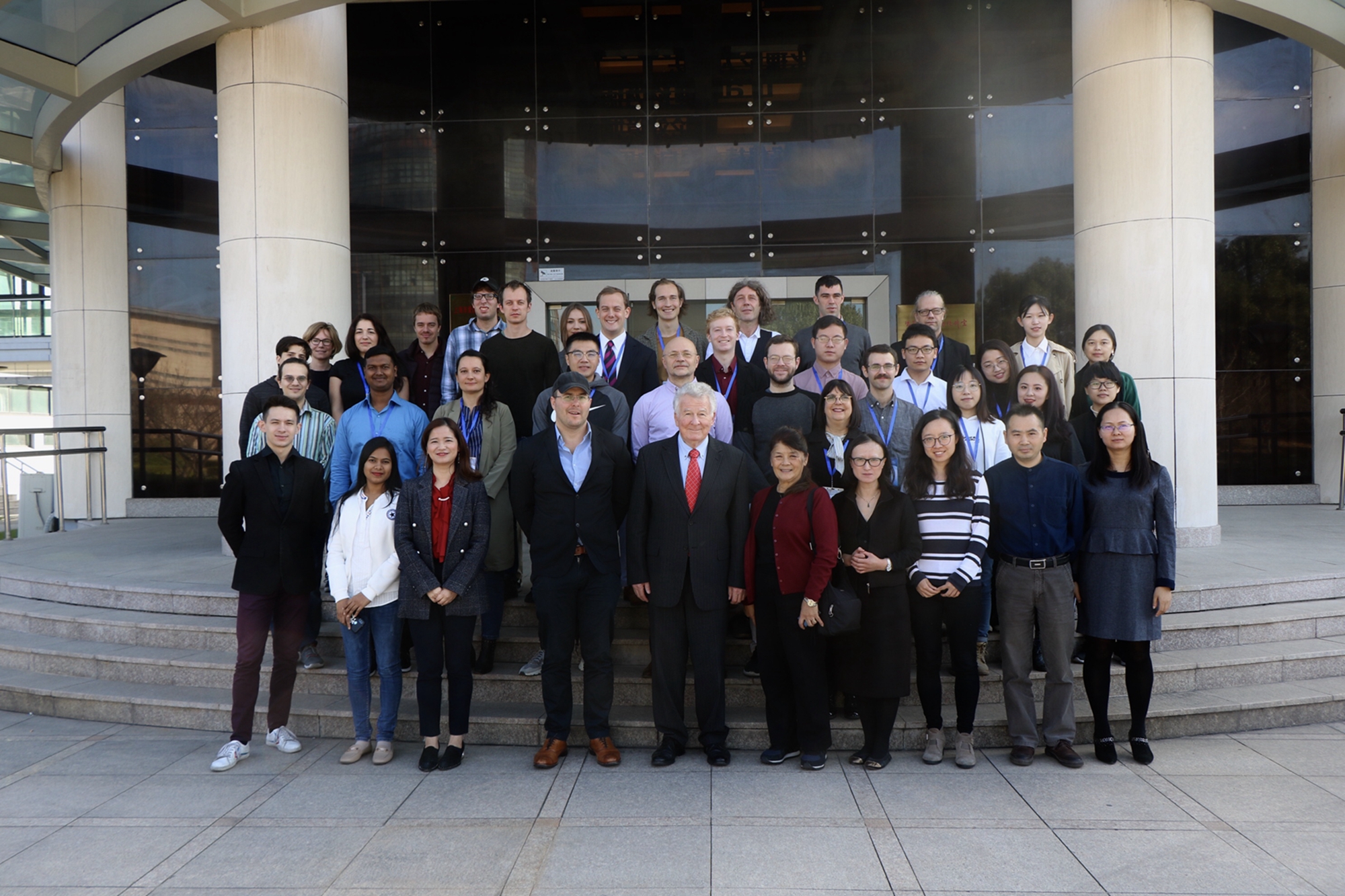
Opening Ceremony
Organizer Rory O’Neill started with a brief thank you to all those who made the conference possible. Professor Roger T. Ames (Peking University), Mrs. Sun Qi (Global Education Center, ECNU), Mrs. Liu Xiaoling (Graduate Students College, ECNU), Mrs. Wu Juan (Department of Philosophy, ECNU), Professor Liu Liangjian (Department of Philosophy, ECNU) and Professor Paul J. D’Ambrosio (Department of Philosophy, ECNU) takes part in the opening ceremony. Dimitra Amarantidou (ECNU) speaks “from the heart,” giving a speech of the word “heart” and how it relates to practice in several different languages, as well as on the conflict that occurs between theory and practice,Li (理) and Shi (事).
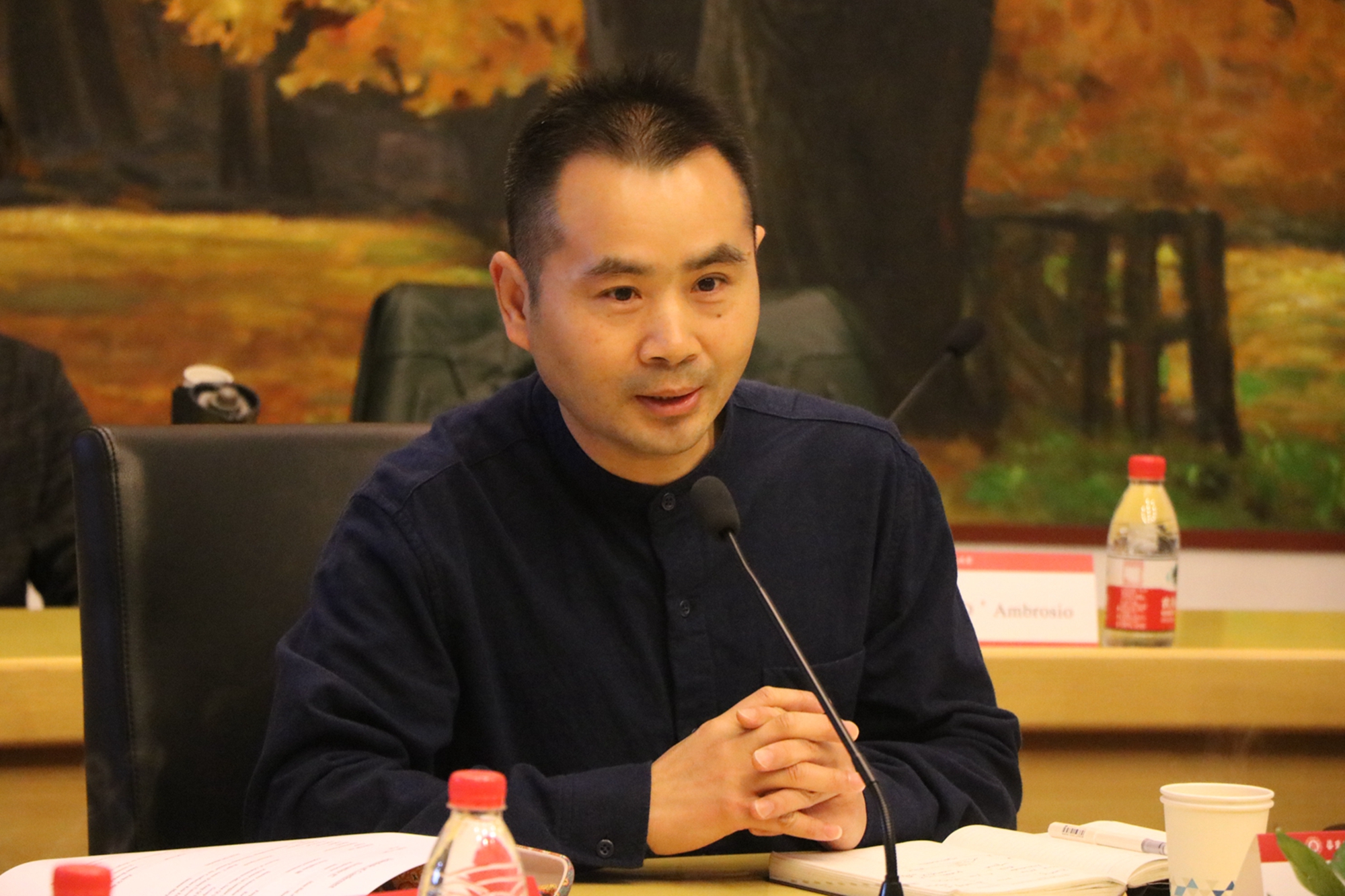
Then Liu Liangjian gives a speech thanking people for attending, and then goes into a discussion of the history of ECNU’s English-taught Chinese philosophy program; the program has expanded from only one student in its first year (2015) to a collective total of 10 in 2019. Liu Laoshi also discusses how the idea for an international conference first came to fruition.
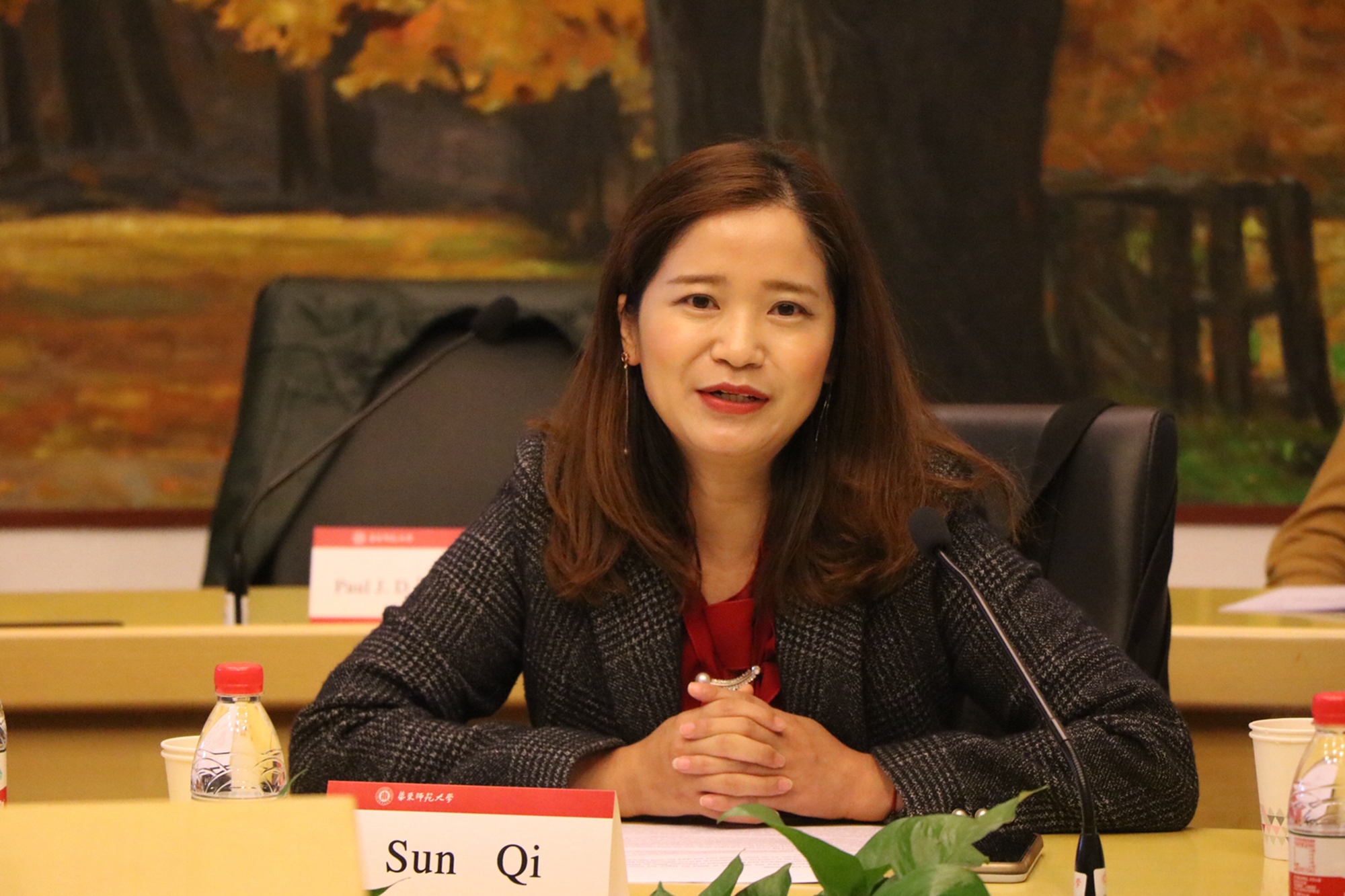
Next up, Sun Qi Laoshi makes a brief introduction of the global education at ECNU. The first international student of philosophy admitted to ECNU came in 1996. Chinese philosophy is a highly-regarded field of study in China. ECNU International student body is composed of around 5000 student, representing 130 some-odd countries. The goal of the Global Education Center is to share a love of all mankind, and this conference is helping to push that goal forward. Finally Rory gave a final welcome to everyone in attendance, with students ranging from ECNU to all around China, as well as from all around the world. What a great start!
Summary of Keynote: Prof. Roger Ames
Topic: Human Becomings: Theorizing “Persons” for Confucian Role Ethics
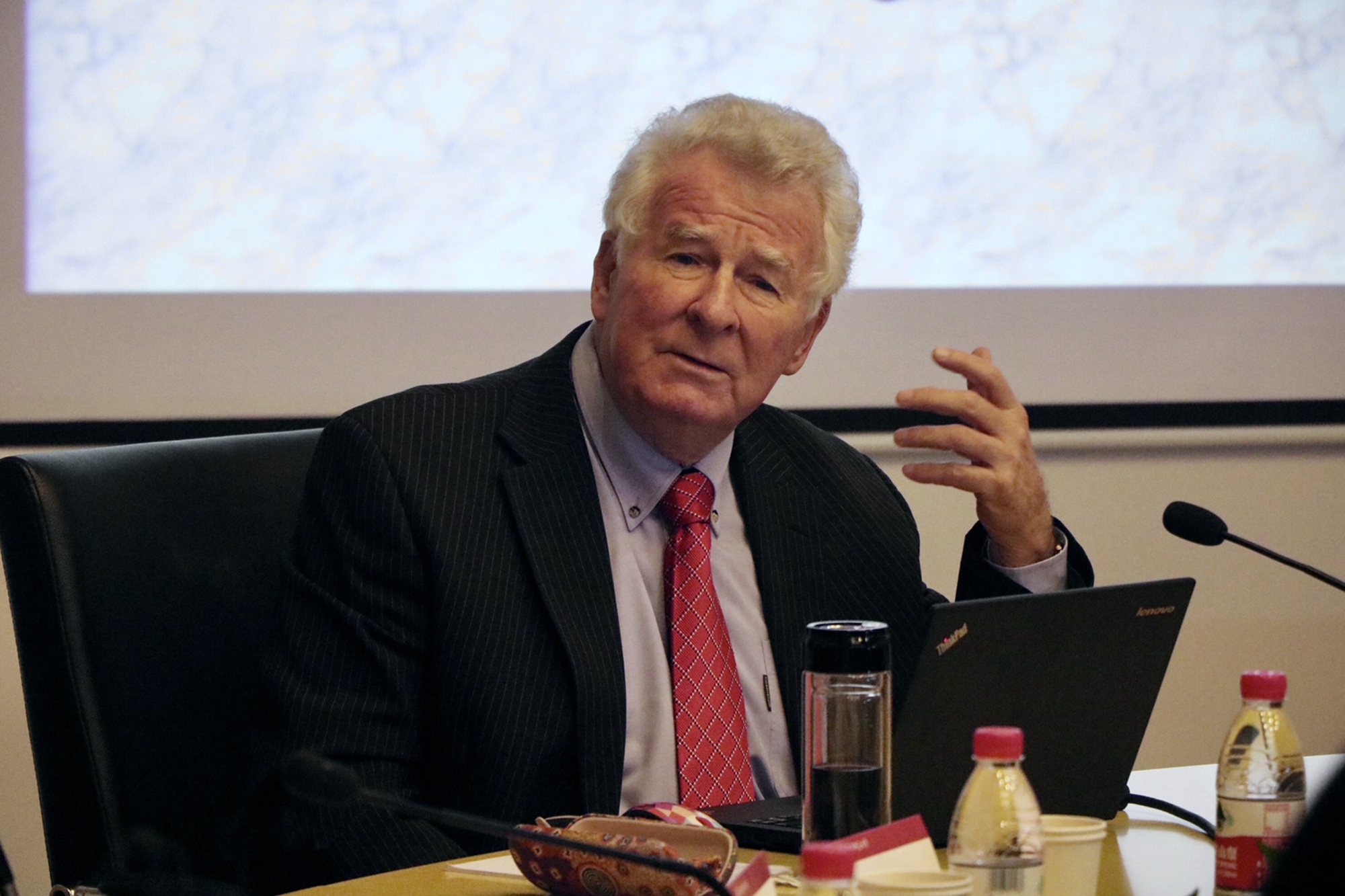
In the keynote speech which opened the first day of the conference, Professor Roger T. Ames gave a talk entitled “Human Becomings: Theorizing “Persons” for Confucian Role Ethics,” in the interest of giving Chinese philosophy ‘ a full seat at the table’, without submitting it under the lens of Western philosophy. Professor Ames holds that within the richness of a 2000 year old tradition, Chinese thought has something to offer against the ideology of individualism which permeates throughout today’s discourses, namely, the concept of human ‘becoming’ instead of ‘being’ that one can read from Confucian role ethics. Unlike a static and atomistic understanding of human as individuals under the typical framework of the West, ‘human becoming’ captures the relational aspect of being human, where the roles we take up vis-à-vis one another are integral to who we are, and where humanity is not what we are but what we do. It is in this understanding of human becomings in Confucianism, wherein which the family is its starting point and the source of its (non-transcendent) religiosity, that Professor Ames sees the contribution of Chinese thought in responding to global crises (such as climate change) to which individualism is insufficient. The maxim, repeated throughout the talk, was ‘optimizing symbiosis’ – as relational human becomings, in ‘family-ing’ the world, Confucian role ethics offers us a paradigm by which we can creatively collaborate with distant peoples of the world, ‘each in our differences,’ as a family would.
Summary of Keynote: Paul J. D’Ambrosio
Topic: The Badass Goes Beyond Comparisons: On Henry Rosemont Jr.
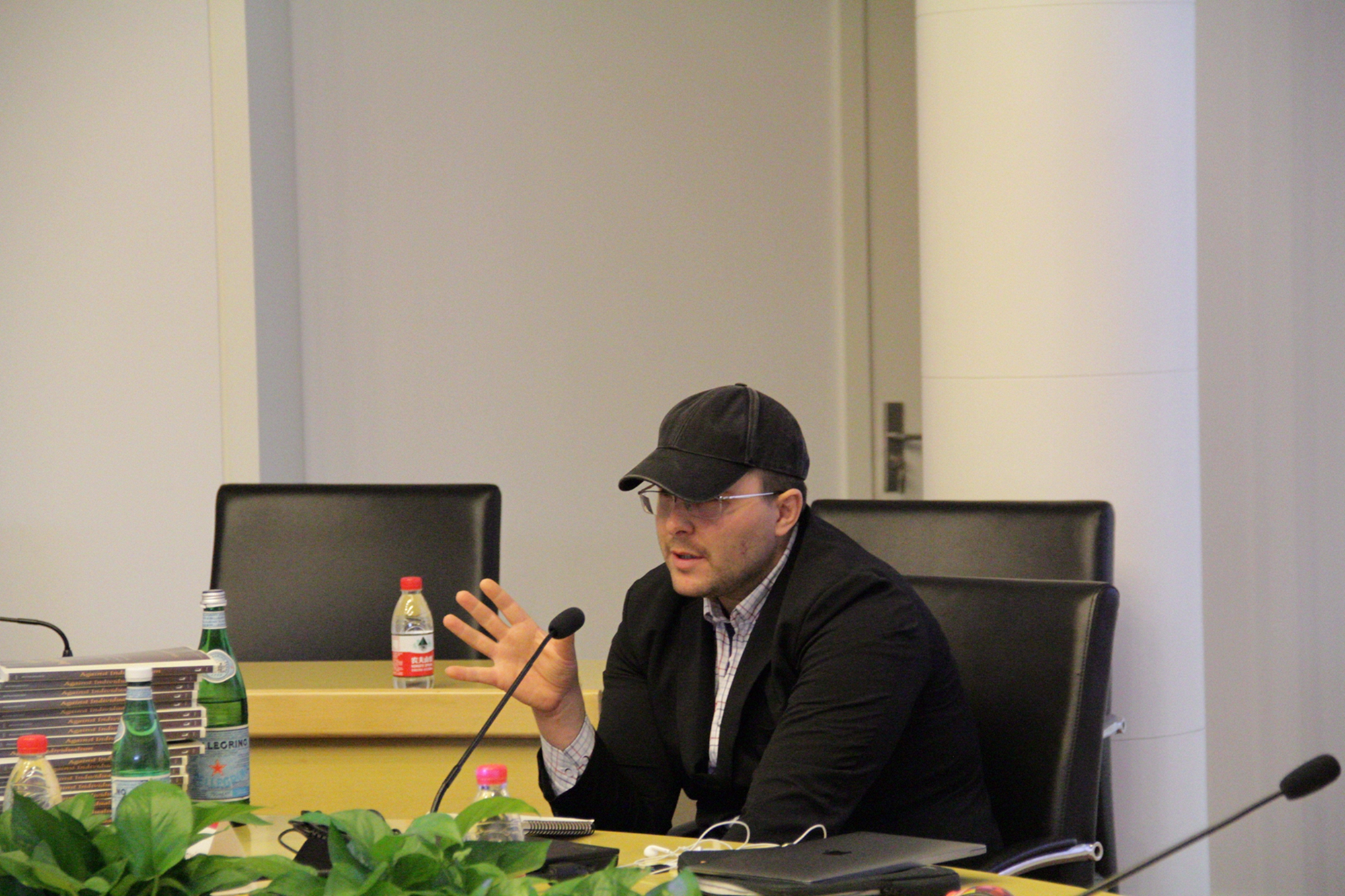
On the final day of the conference, Professor Paul D'Ambrosio gave the keynote speech entitled, "The Badass Goes Beyond Comparisons: On Henry Rosemont Jr." in tribute to the late Henry Rosemont Jr., who is an exemplar in doing comparative philosophy. Addressing the graduate students in the audience, Professor D'Ambrosio prefaced that even when we are studying 'purely' Chinese or Western philosophy, academic philosophy is always comparative because it nevertheless involves language gaps and translations between cultures. Taking Rosemont's seminal work Against Individualism as the example, Professor D'Ambrosio argues that we must go about philosophizing like a 'badass' - that is, to be skilled, daring, independent, and unorthodox. Rosemont was such badass, for he stood as his own thinker, not hiding behind any authority or orthodoxy, completely honest in showing his own presuppositions, inviting dispute, not afraid to be wrong, and in short, 'displaying Confucius without being Confucian'. Finally, a badass must consider their work as a service for others, like a 'worker bee' that shows the way to the pollen. In this way, does the badass go beyond comparisons to truly think and change lives.
Agne Veiseite
“Choosing in Ancient China: Enacting Inclinations Through Yijing and Expertise”
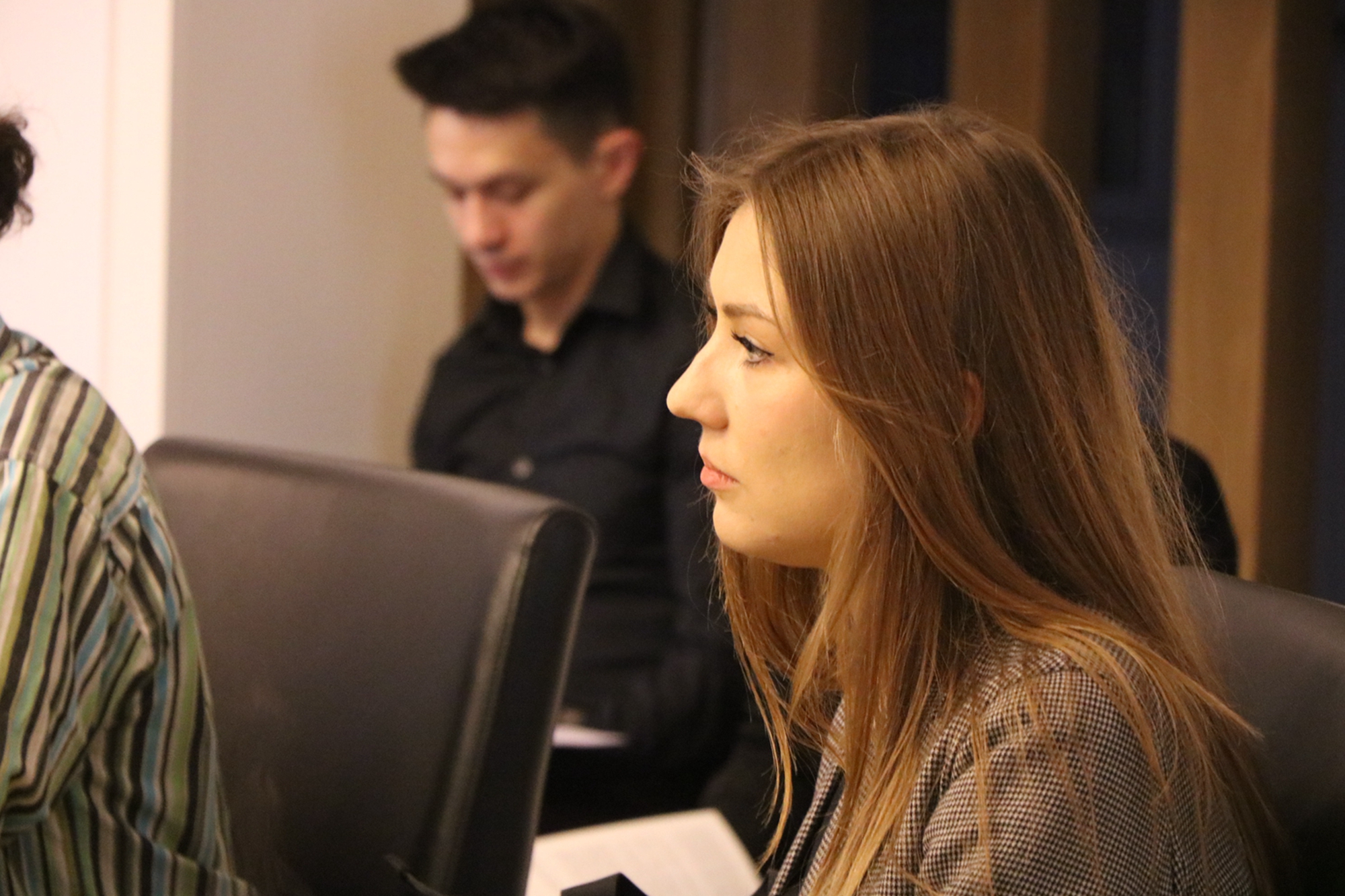
Agne Veiseite begins her paper with an observation that a clear analog to the idea of “choice” as the rational decision-making between at least two possibilities in the Western traditions is absent in Chinese thought. There is, instead, an emphasis on following one’s natural inclinations. She uses the Yijing to draw out this emphasis. The obscure and trite remarks contained in the commentaries of the hexagrams appear, according to Veiseite, to goad one’s natural inclinations, to situate and guide them. What is called “expertise” reflects one’s ability to rely on one’s inclinations. There is no “starting point” to making choices in the Yijing, just the enabling of one’s ability to act. Making good choices, she contends, comes from personal cultivation and making better choices leads one to better living.
Andrew Hull
“Aristotle and Confucius on Practicing Politics”
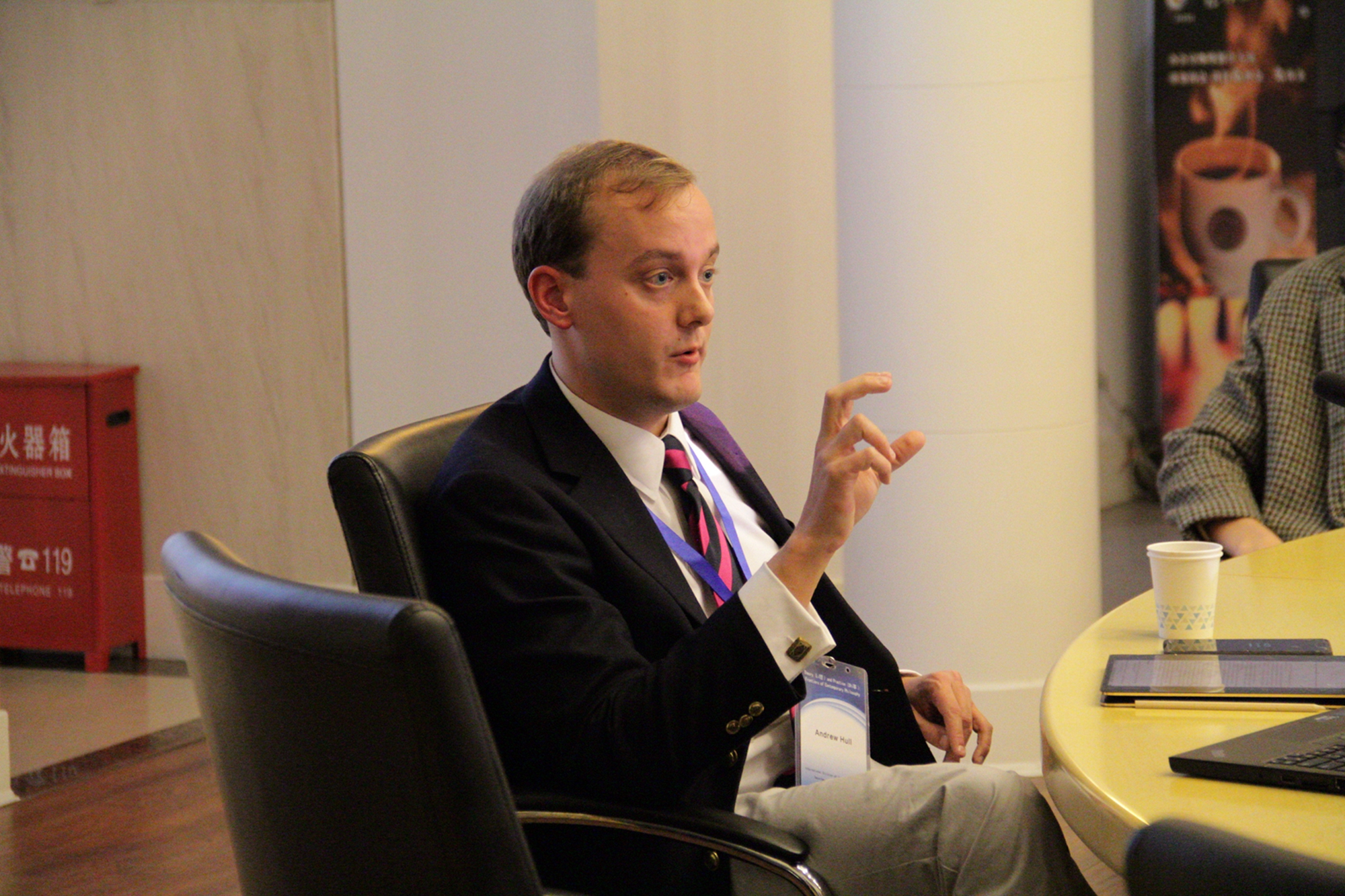
Andrew Hull provided a comparison between Confucius and Aristotle on the art of practicing politics. Andrew argued that although Confucian philosophy is more commonly compared to Platonic philosophy, there is also a case for comparison with Aristotle. Plato focused on the classes rather than individual citizens, and Aristotle’s focus on all citizens may be more comparable with Confucianism. Andrew suggests that Aristotelian and Confucian philosophy share common ground in understanding the importance of moral exemplars as political leaders. The notion of shame before moral superiors is an important aspect of Aristotelian philosophy and Andrew invites comparison with how leaders and subjects relate in Confucian philosophy.
Andrew Wells-Qu
“What Can't Be Said: a Daoist reads Nietzsche”
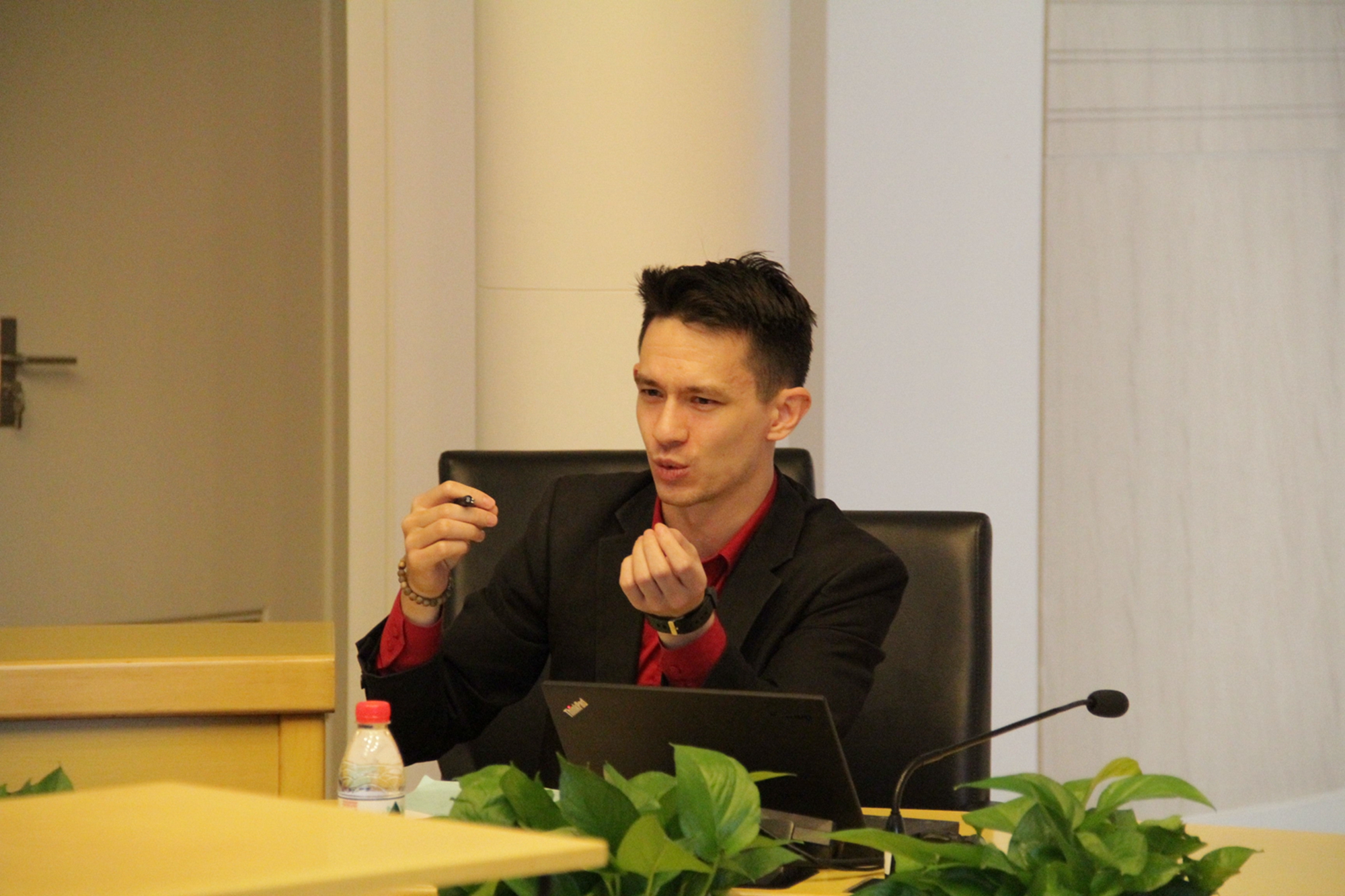
Andrew Wells-Qu’s discussion revolved around the unreliability of language, especially in regards to philosophical questions, answers, and especially discussions. When trying to discuss precise and complex ideas, how do we make sure that we are not misrepresenting the ideas using unreliable and imprecise language. His primary question: How do we discuss anything, much less the Dao? To answer, we would need to first unpack the Dao. Then we would need to unpack everything else. In truth-finding, there are several strategies one could take. One is Wang Bi’s approach, which Wells-Qu understood as considering Dao as wu无. Second would be taking a Nietzschean perspectival view. Third would be a Zhuangzian skeptical perspective.
Carlo Cogliati
“Ten years of financial scandals in the West: A philosophical lesson from the East”

Carlo Cogliati provided an analysis of the Libor (London Interbank Offered Rate) financial scandal of 2005 to 2009 and concluded that solutions offered to rectify these actions were grounded variously in consequentialist, ontological and virtue ethical principles. Carlo argued that at the root of all of these approaches, which have not succeeded in rectifying the offending practices, is an individualist outlook. Carlo suggested that these institutions could benefit from Eastern philosophies, which are grounded in a worldview which sees human activity as interconnected. Confucianism and Buddhism are two examples of such philosophies which can help encourage interdependent and collaborative relationships among financial institutions, regulators and the financial community.
Dimitra Amarantidou
“You Cannot Say the Same Thing Twice: Change and Irony in the Analects”
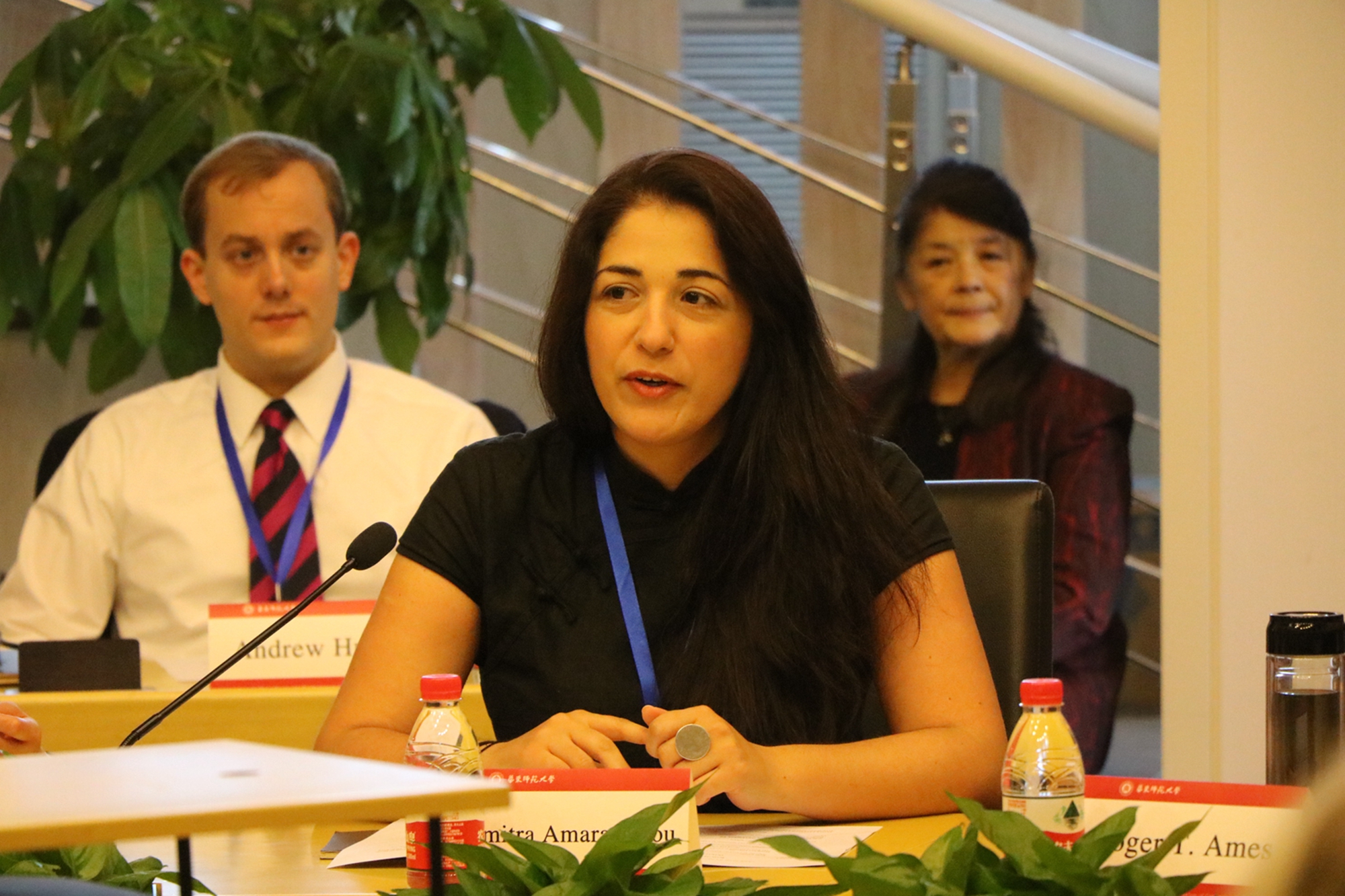
Dimitra Amarantidou identifies a tension in the Analects of Confucius. She sees Confucius caught in a bind between his having authority on moral matters and his anti-doctrinal attitude. Amarantidou believes that Confucius uses irony and humor to reduce this tension as well as to mimic change through language. Part of Confucius’ pedagogy is his indirectness with his students, as he will provide different descriptions of important virtues like ren仁 to different students. This is an example of the tension Amarantidou observes in the text and furthermore calls it paradoxical because it maintains these two opposing elements. She concludes by saying that the irony in the Analects also works to maintain the text’s relevance. Irony keeps Confucius alive.
Ding Hongran 丁洪然
“从《论语》出发谈对伦理运气的应对”
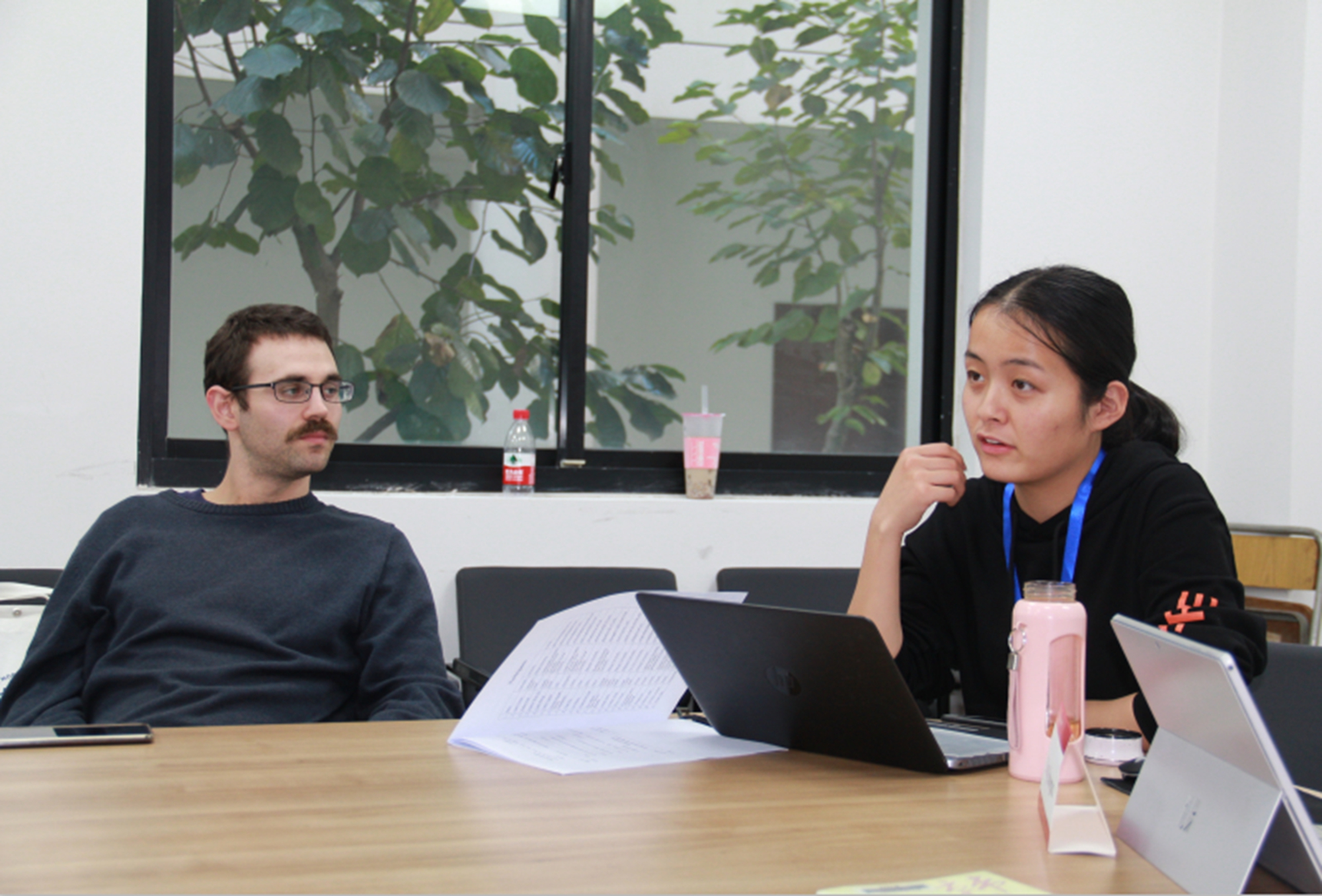
Starting with an explanation of the concept of luck (yunqi 运气) in the field of virtue ethics, Ding Hongran showed how this is, in a sense, equivalent to the Confucian concept of "timeliness and circumstance" (shiming时命). Based on a reading of the Analects, her paper explores the Confucian understanding of this issue by reference to three elements of the exemplary person’s (junzi君子) character: poor, engaged in learning, and willing to put oneself in another’s place (shu恕). Finally, Ding showed how this question can help our understanding of the ethical wisdom of Confucianism, from “using ren (仁) to influence a fate which is determined by luck” to “using ren to help ensure a smooth life.”
Feng Li 冯莉
“礼的文化传播:身体、仪式与意义的共享——兼论符号形态与伦理秩序的建构”
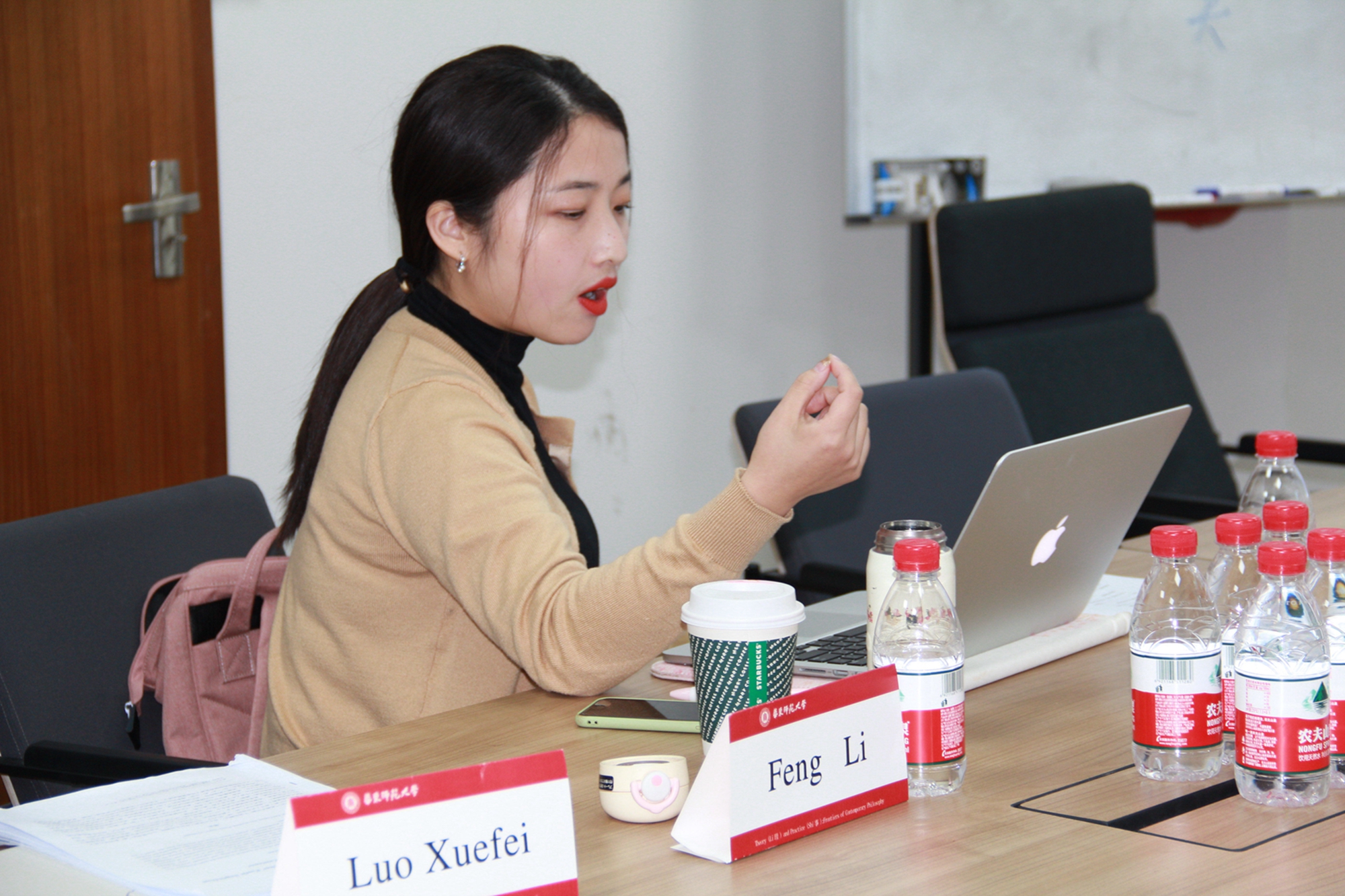
Feng Li provided an analysis of the world of ancient ritual (li礼) within the field of communication and in particular from the perspective of cultural communication. This highlighted the importance of body in ritual. Feng provided an analysis of how rituals succeed in maintaining social stability and normativity through ritualized life. New media technology has brought about a new era in terms of people’s cognition and lifestyle. In the face of this newly established order, Feng argues it is necessary to enhance the participation of the body in the field and realize a meaningful life by paying attention to the key elements of social ritual propriety.
Ge Huang
“Moral Autonomy and Personal Autonomy in Contemporary Practical Philosophy”
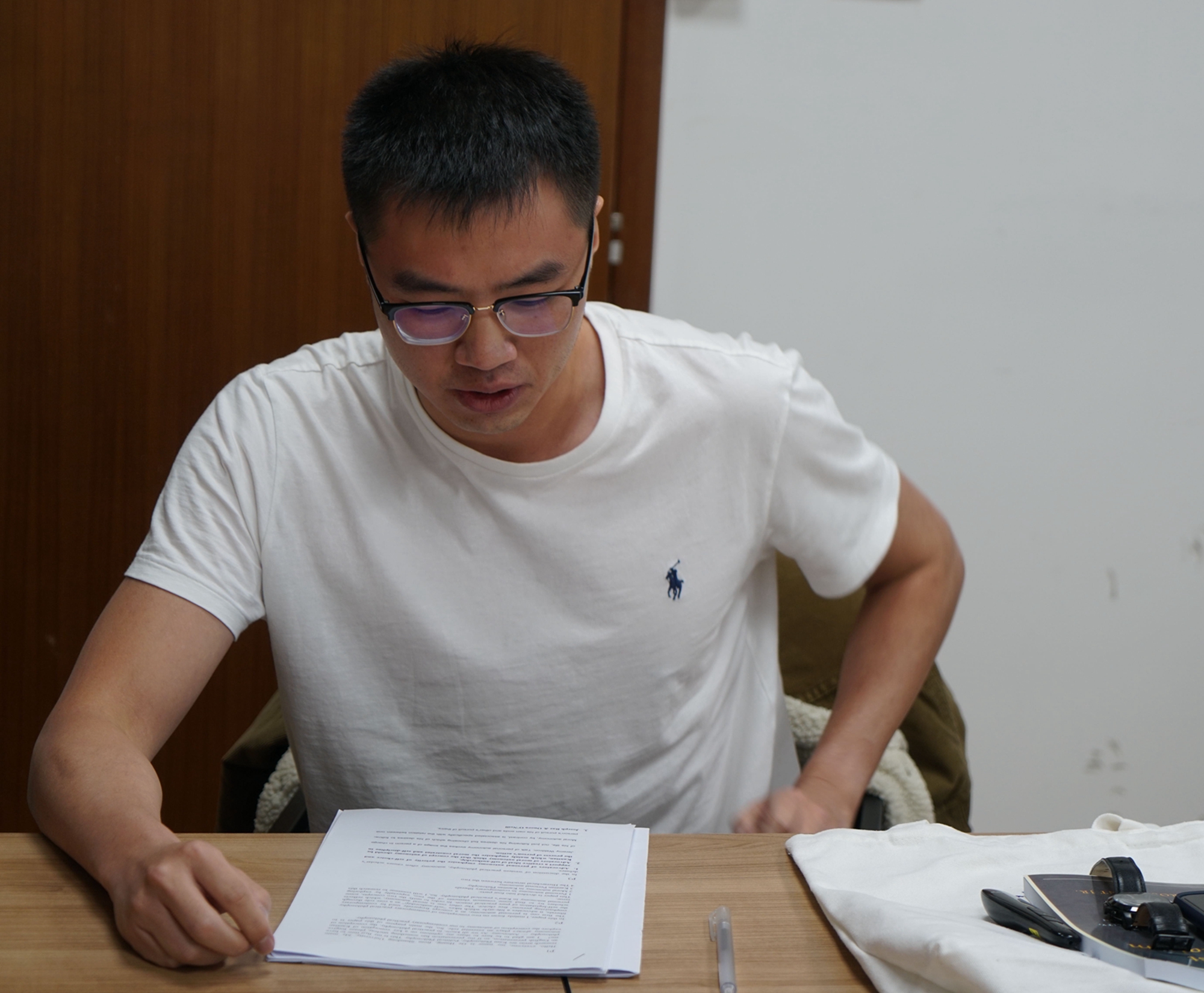
Ge Huang’s paper works between two different conceptions of autonomy: on the one hand there is a classic liberal approach to personal autonomy and the Kantian emphasis on moral autonomy. The former capitalizes on an individual’s ability to execute and commit to personal choices and the latter is a disclosure of practical reason not entirely subject to personal manipulation. Ge Huang attempts to bridge these two ideas of autonomy. Rather than following the, what he sees as problematical, ways of other scholars, Ge Huang instead focuses on the German Wille and Willkür, Will and Choice, as they occur in Kant and builds out a hierarchical schema to understand the relationship between personal and moral autonomy.
Guan Xin:
“The Motivation of Moral Practice--From the Perspective of ‘Knowing-to’’
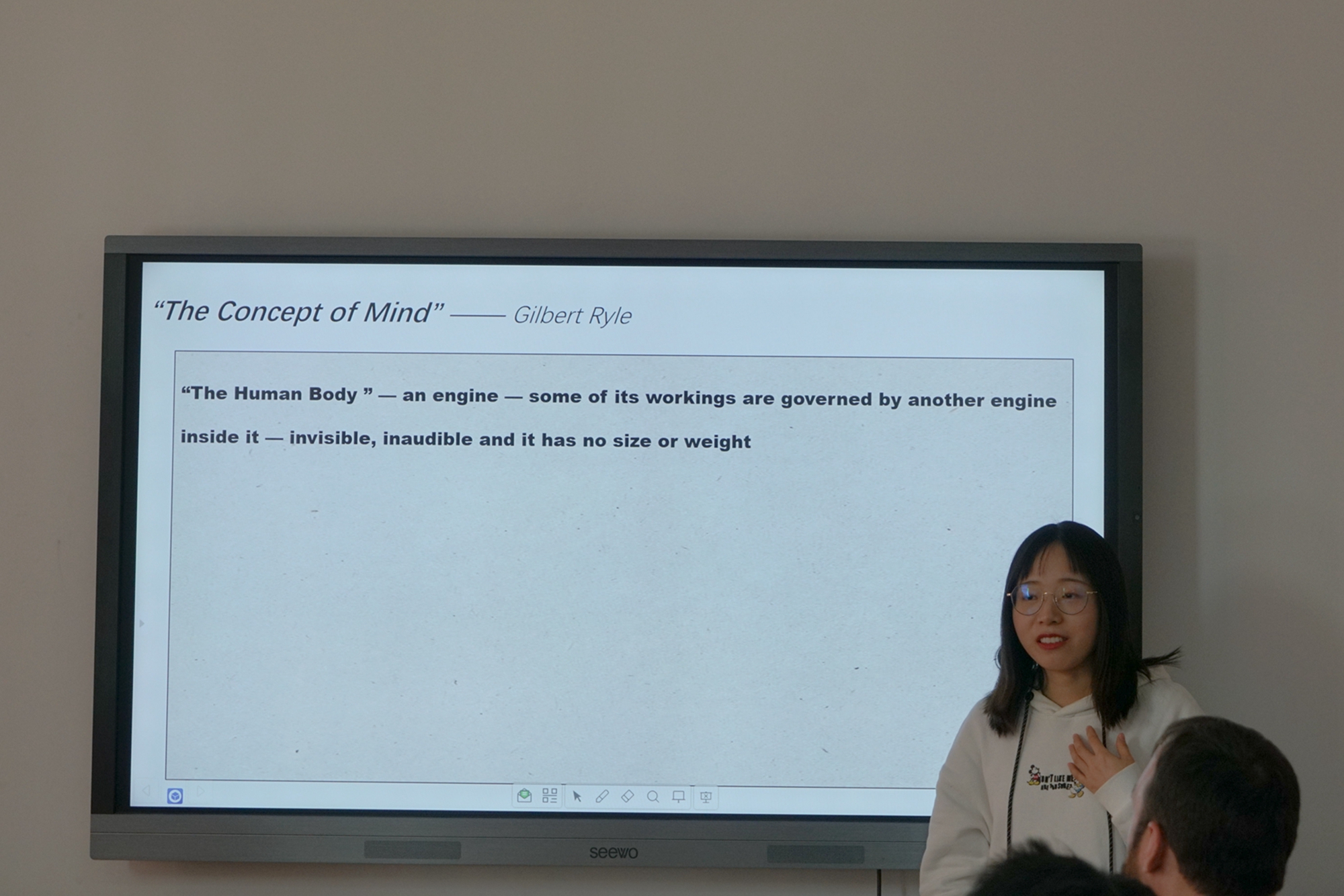
Guan Xin began her presentation with an overview of Gilbert Ryles’ concept of mind and the distinction he makes between ‘knowing that’ and ‘knowing how’. She then explored the contribution of Chinese philosophy to such issues through discussing the scholarly debate between Professor Huang Yong and Professor Yu Zhen-Hua. This debate revolved around the distinction between ‘knowing-to’ and ‘knowing-how’. With this debate serving as her theoretical background, Guan Xin demonstrated how the traditional Chinese philosophy of ‘knowledge and action’, which relates to practical wisdom, can contribute not only to contemporary issues in epistemology, but also provides solutions to the idea of motivation in moral practice.
Huang Xiaoyuan
“Moral Reasons and Practical Wisdom”
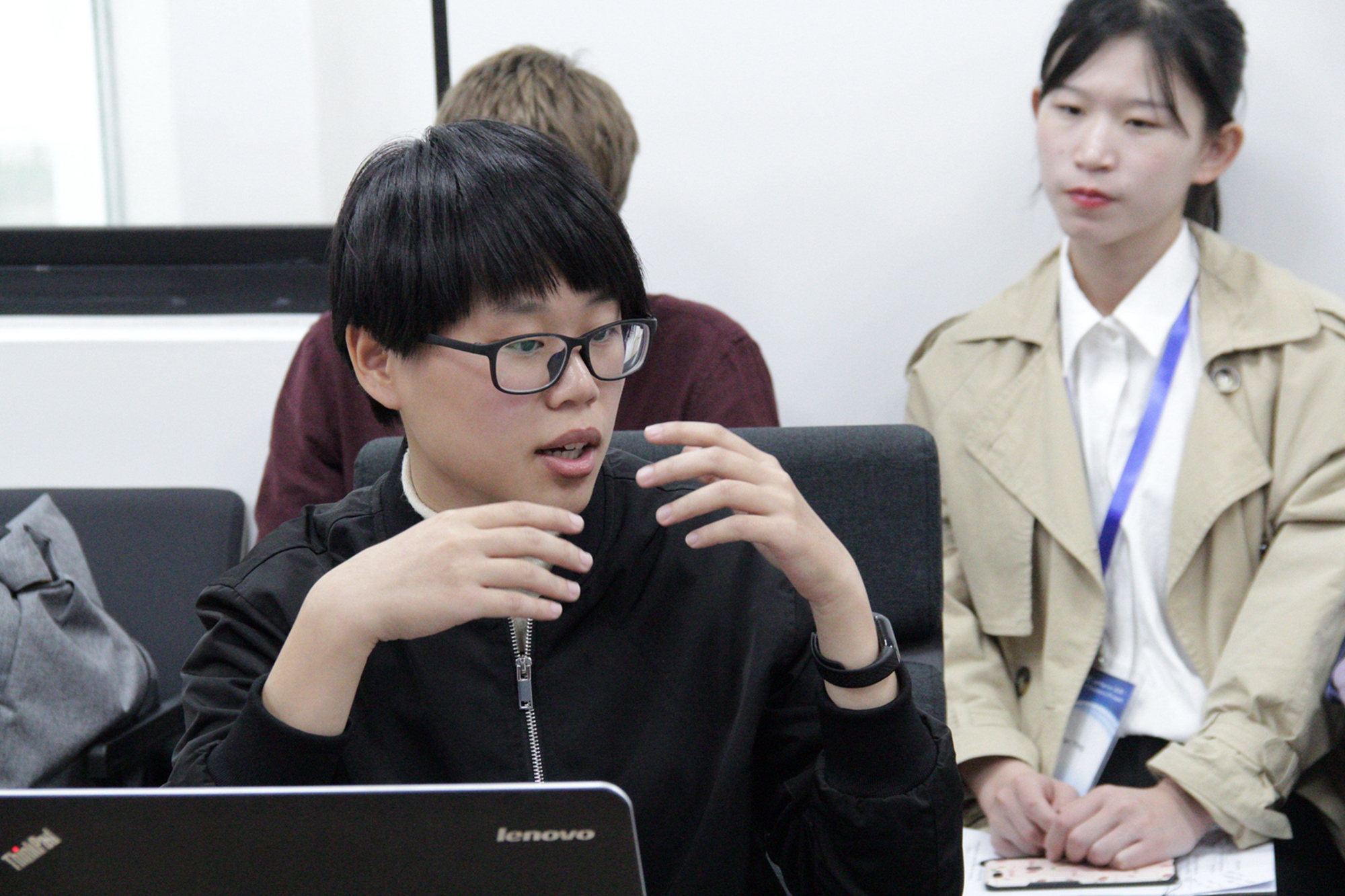
Huang Xiaoyuan presented the distinction between reason internalism and reason externalism. She explained that reason internalism has its roots in David Hume's account that emotions are the motivation for actions and is developed by Bernard Williams' proposal that reasons for acting are grounded in subjective motivations. Reason externalism, on the other hand, holds that moral reasons are not grounded in these subjective motivations but rather by rationality, as per Kant's deontology, or practical wisdom, as per Aristotle's virtue ethics. Focusing in particular on neo-Aristotelian criticisms of reason internalism, Huang then argued that the Aristotlian account itself is overly demanding. She concluded that accounting for our moral lives might require appealing to more than one explanation.
Ilari Makela
“Confucianism and Human Rights: Towards a New Consensus”
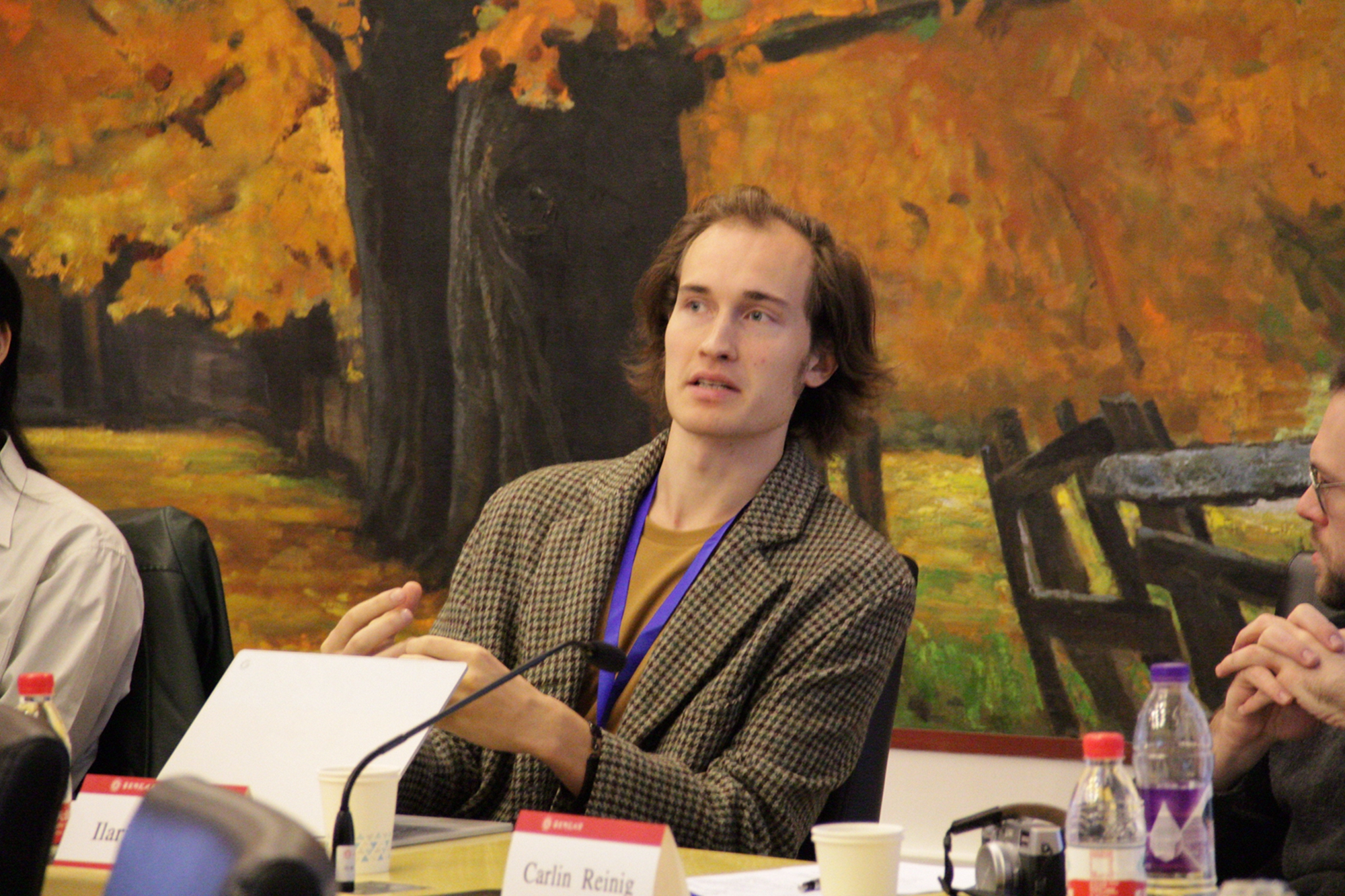
Ilari Makela’s presentation focused on a novel way in which we can align Confucianism with modern human rights discourse. Makela made the case that we should consider the division between the core and non-core human rights as defined by two International Covenants held in 1966, whereby only core human rights are regarded as non-derogable. Such rights include the right to life, freedom from torture and inhumane treatment, freedom from slavery, and freedom from arbitrary means of justice. Ilari argued that these core human rights fit organically with Confucianism, specifically in regards to the Confucian conception of human dignity, and concluded that this convergence sheds doubt over generalized claims that Confucianism is not compatible with 1st generation human rights.
James Brown-Kinsella
“Cloudy Stream of Consciousness: Cheng Hao’s Account of Nature”

James Brown-Kinsella explained the Neo-Confucian scholar Cheng Hao's theory of nature (xing 性) distinguishing it from material force (qi 氣) and what is inborn (sheng 生). Rejecting the common assumption that Cheng Hao thought we had two natures, Brown-Kinsella contrasted Cheng Hao's theory of nature with that of Zu Xi and Cheng Hao's brother, Cheng Yi. Presenting arguments that principle (li 理 ) part of nature corresponds to mind, he concluded that Cheng Hao held that not only do all living beings have a nature, but that this (li 理) aspect of nature is the same for all individuals.
Jordan Davis
"Human Action and Moral Psychology--an Initial Comparison between Mengzi and the Stoics"
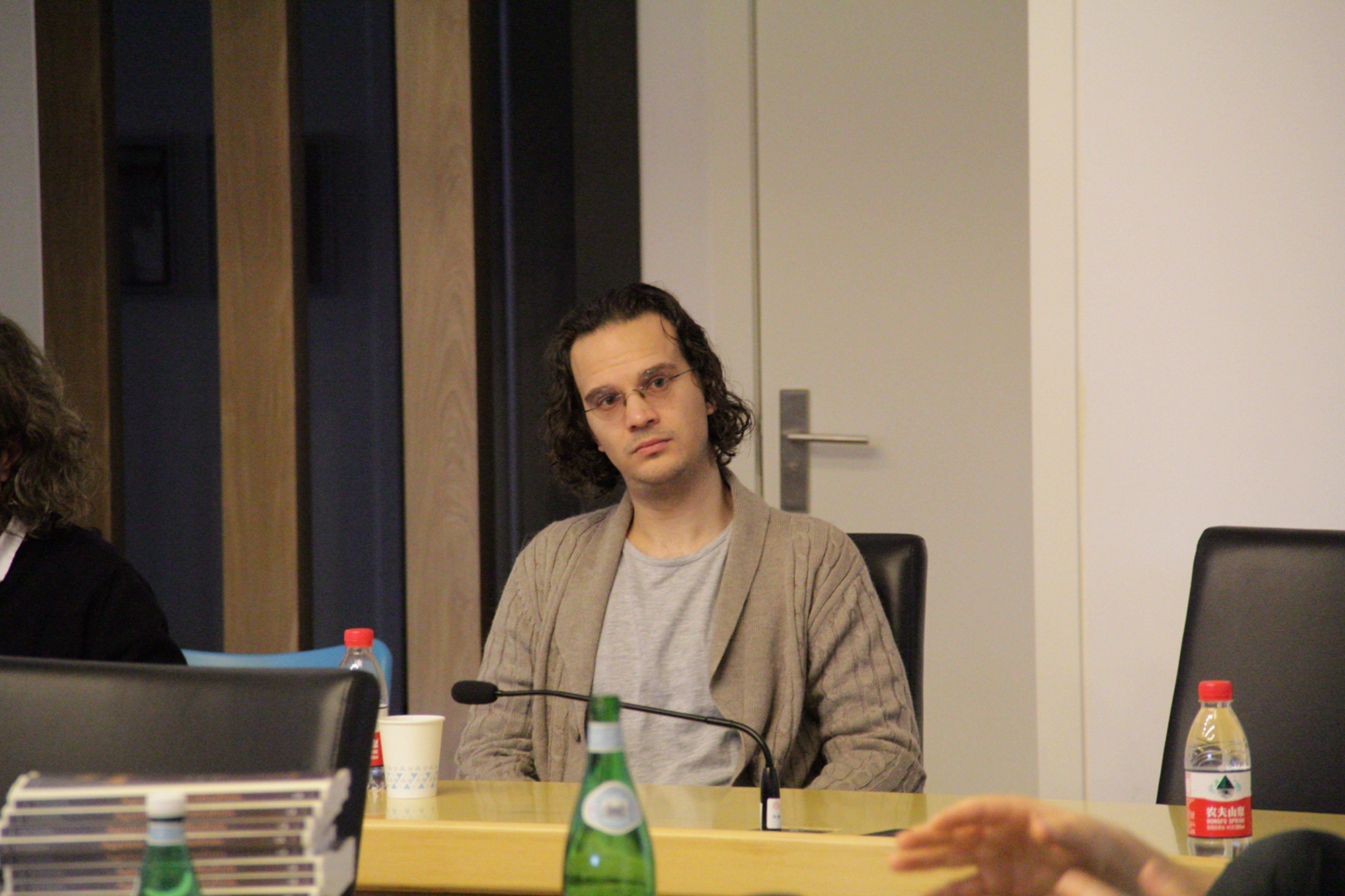
When we look at an action, how do the emotions connect to reason? Jordan Davis follows this line of inquiry. This philosophical question has a long tradition in more than one culture. However, we run into problems when we blindly apply modern psychological theories to understand ancient ideas. State-of-the-art neuroscience has indeed produced a useful framework, but there are too many opportunities for misinterpretation when trying to fit it to other frameworks, not least due to the gaps of time and space, culture and language. Davis offers a more sensitive mode of comparative philosophy by instead using a Hellenistic Stoic theory of action to unpack the Chinese thinker Mengzi's moral psychology. These two ancient theories have well-established views on rationality and are therefore more compatible. Some thinkers Davis considers include the precursor Plato (with a tripartite soul in Republic), the Stoic Chrysippus (with an 8-part monistic soul), Mengzi (a monistic or holistic equivalence between the affective and reflective), and Xunzi (each sensory organ an official judging different data).
Josepha Golan
“Spot the Bear: Chinese Masterpiece as an Inspiration for Creativity and Innovation”
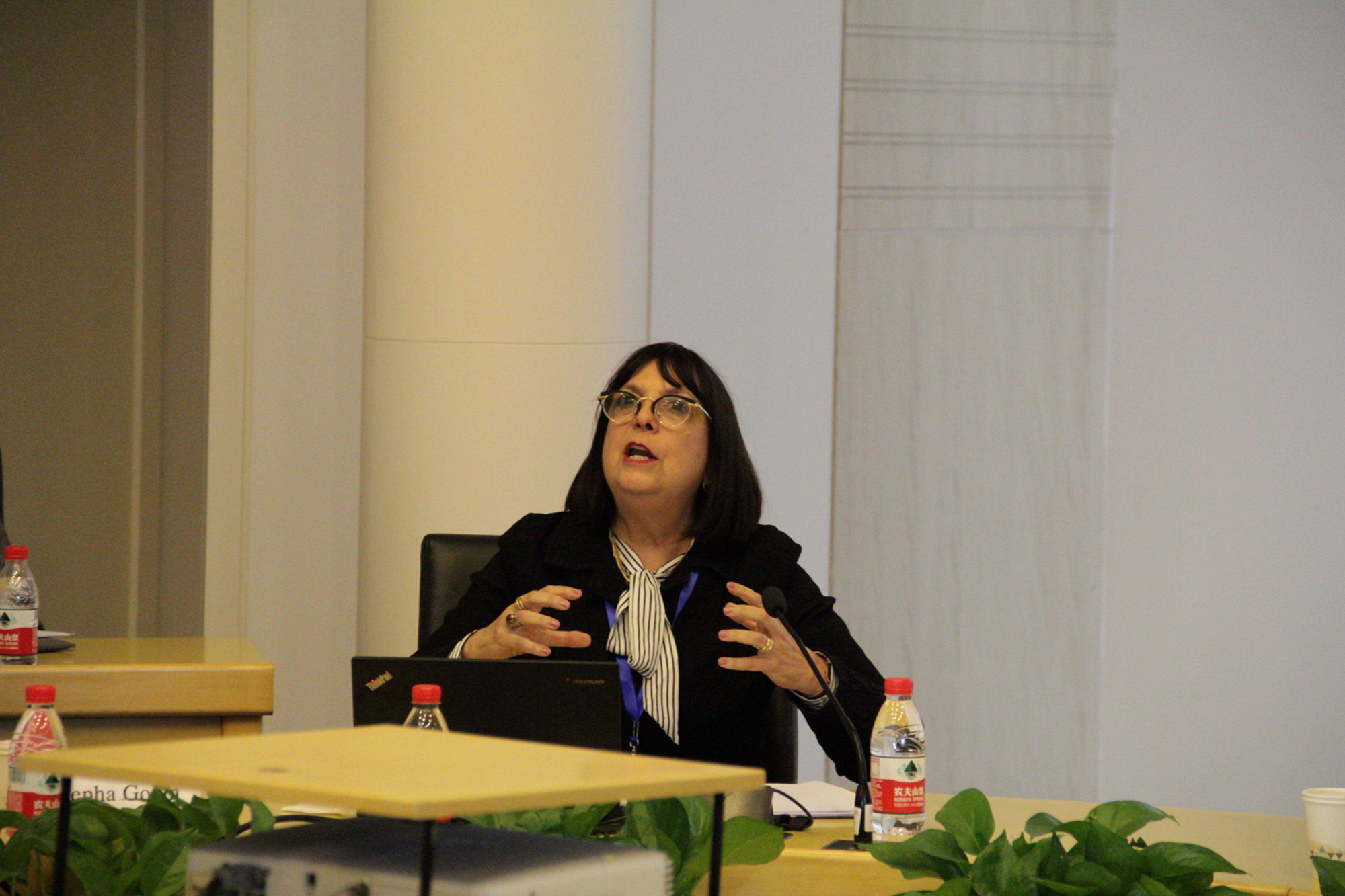
Josepha Golan provided a new analysis of the Admonitions Scroll, an ancient Chinese handscroll masterpiece. The opening scene of this handscroll depicts an attacking bear, and the artwork is usually taken to depict a poem written a hundred years earlier. Golan, however, rejects this traditional interpretation, instead proposing that the "bear" was originally no more than a mistake, a spilled blotch of ink on the canvas. She notes how the bear is drawn in a very different style than the rest of the figures on the scroll—much more crude and saturated with ink, without layers or fine, thin lines. She claims that the artist repurposed the blotch as a bear and then used it to depict a scene from the poem. In this analysis she finds plenty of insight into the preoccupations of the royal court as well as the nature of artistic production and even how we should approach our own lives.
Kevin J. Turner
“On Subjectivity and Objectivity in the Mengzi—or Realism with a Confucian Face”
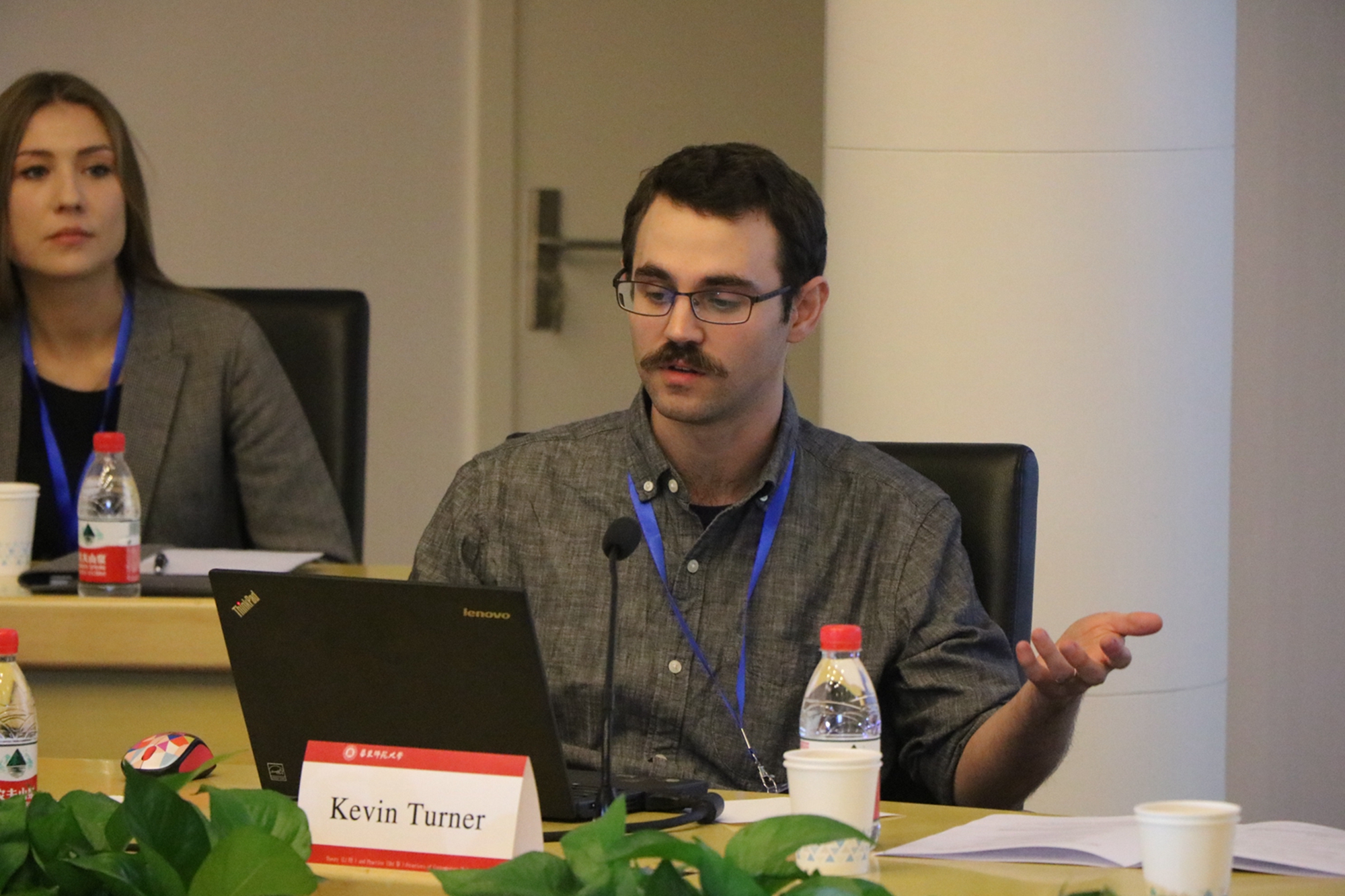
Kevin Turner presented his interpretation of the philosophy of Mengzi, understanding it as "realism with a Confucian face." He does this by noting how the categories of subjective and objective have been misapplied to Mengzi's philosophy. Instead of being either subjective or objective, Menzi’s philosophy is a philosophy of “mind-world interdependence,” wherein “the mind and its world entail and constitute each other.” He gets there by analyzing the relationship between the terms xin, xing, and tian in Mengzi’s thought. He ultimately finds common ground between Mengzi and Hilary Putnam and claims that Mengzi's philosophy is a realism that brings the subjective and objective together. This is “realism with a Confucian face” because for Mengzi, the heart-mind is the internalization of an external Confucian morality, tian.
Krzysztof Korżyk
“Western Analytical Philosophy: A Case of Epistemic Injustice?”
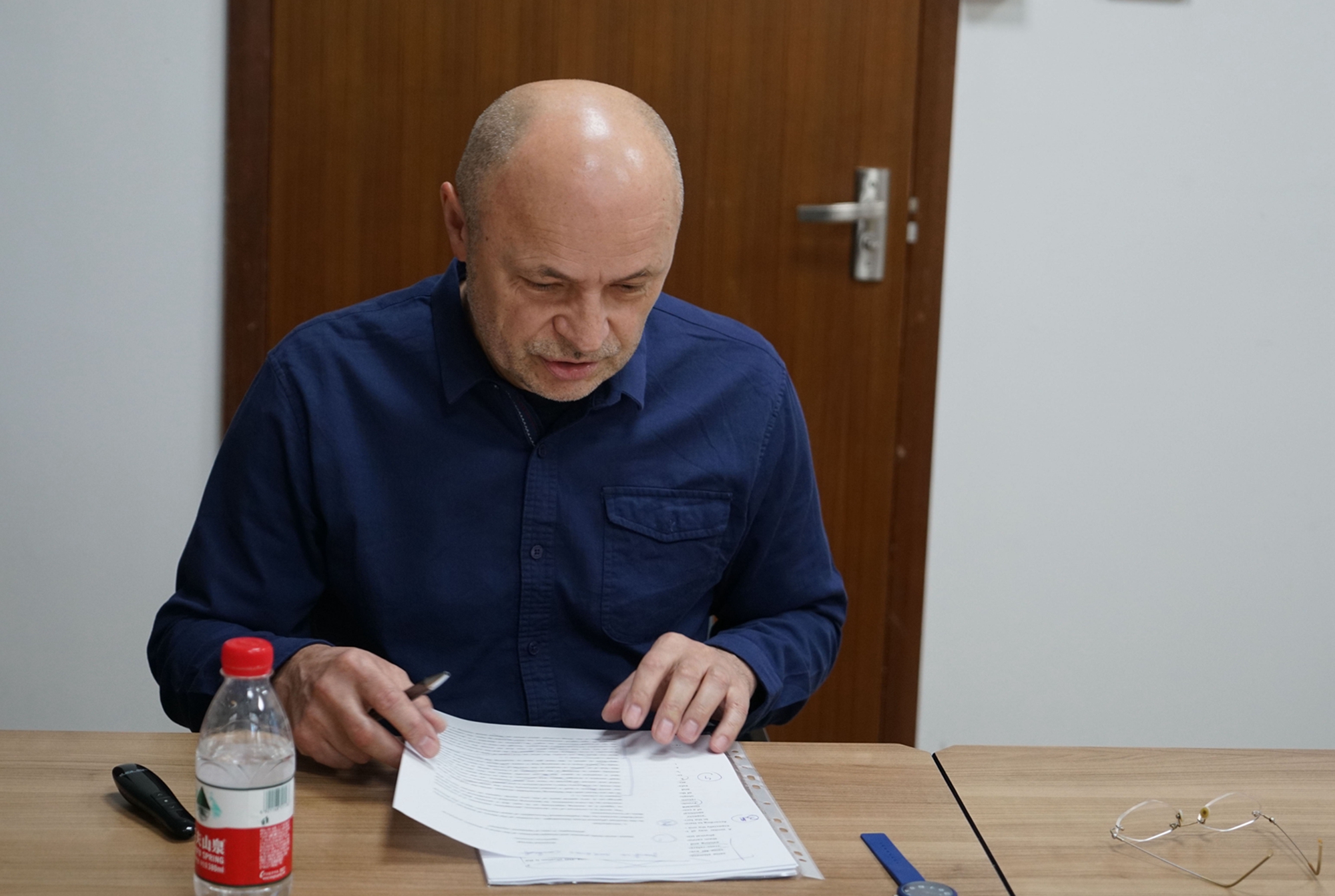
Kyrstof began with a synopsis of Erwin Schrödinger’s conception of the world as inextricable from the mind, and went on to suggest a parallel with classical Chinese philosophy of mind, most notably in Daoism. Discussion of this comparison raised questions such as whether or not there exists a clear distinction between “objective” reality and perceiving subject, and whether or not philosophy can be said to pertain solely to rationalized intellectual activity. Kyrstof contrasts the “mind-body practice” of Daoist philosophy to the purely intellectual approach Western analytical philosophy take towards the mind, suggesting that these two ways of doing philosophy are at opposite ends of a spectrum.
Luo Xuefei 罗雪菲
“非关文字:存在视阈下的禅偈诗意道说研究”
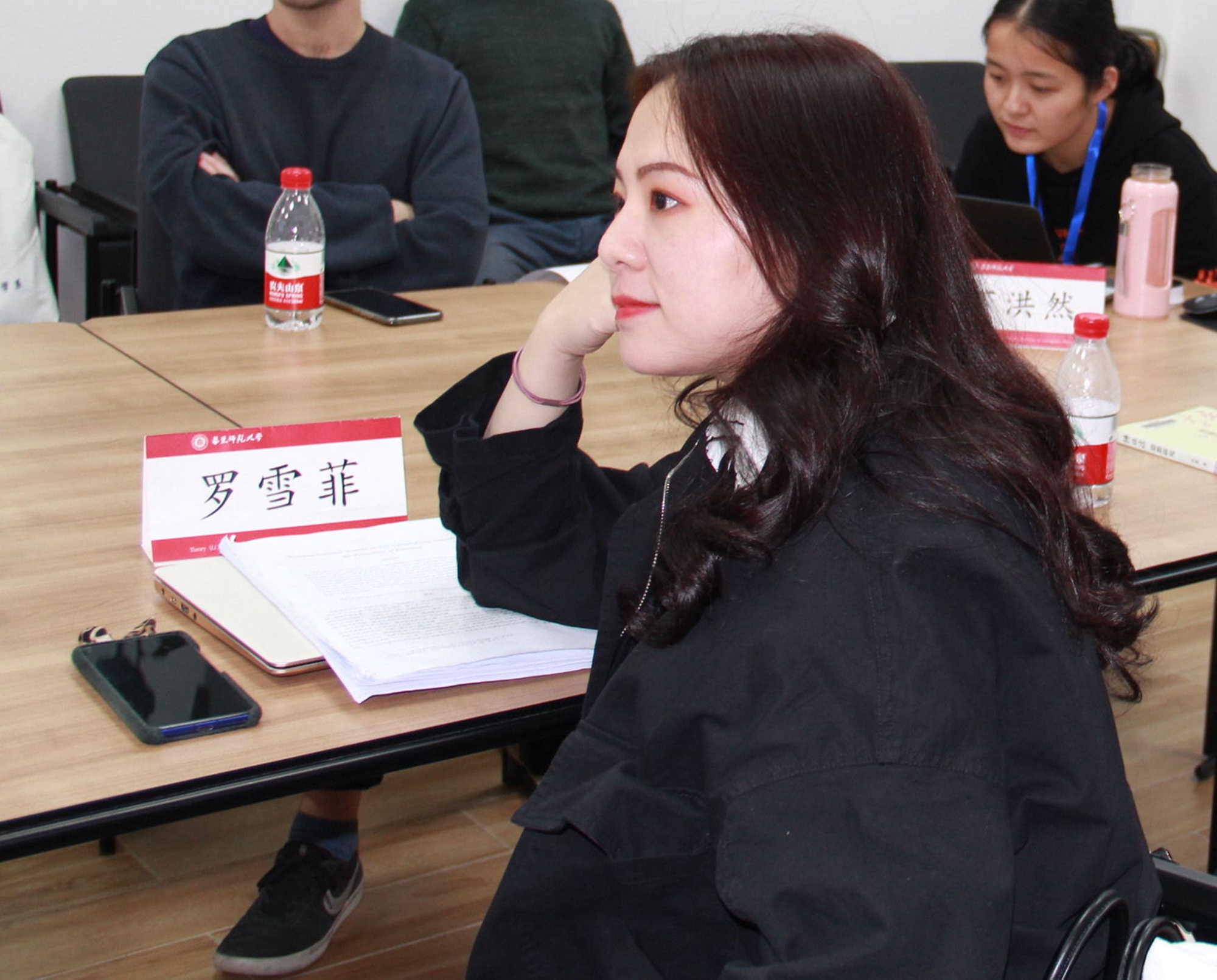
Luo Xuefei holds in her paper Wording-irrelated: A Study on Zen Gathas’ Poetic Sagen that Zen Buddhism speaks Buddhist wisdom on the basis of "wording-irrelated” or “no-wording” (feiguan wenzi 非关文字). In terms of expression, characteristics of thought and poetic expression, this is consistent with the theory of poetry and language pursued by Heidegger. Through comparative research, and on the basis of reinterpretation of classical commentary, we can promote the rich traditional culture found in these texts. At the same time, we can provide guidance for Chinese-Western exchange of ideas and literary and artistic creation.
Magdalena Filipczuk
“The Role of Practice in Chinese Approach to Art: Lin Yutang’s Case”

Magdalena Filipczuk’s presentation focused on the gongfu (功夫) approach to Chinese art, and in particular, Chinese philosophy. Magdalena provided an analysis of the Chinese writer and thinker Lin Yutang (林语堂), whom she described as a “bridge builder between cultures.” Her methodology leans upon the gongfu framework of Peimin Ni (倪培民) which emphasises engagement with the text leading to an embodied understanding. Magdalena juxtaposed this gongfu approach with an intellectual approach, which she suggested only leads to “bookish” knowledge. The term gongfu was used by Song-Ming NeoConfucians to mean “the art of life” and Ni Peimin sees most of Chinese philosophy as belonging to this.
Margus Ott
“Constraint and Veins. Deacon and Neo-Confucianism. Veins and Energy”

Using Terrence Deacon’s Incomplete Nature and Zhu Xi’s work on li 理and qi氣, Margus Ott compared these two thinkers in terms of points of resonance, a term that Ott theorized about at the 2018 conference. Deacon, a contemporary scientist, writes about constraints, work, and processes, testing points of resonance with Zhu Xi’s conception of li and qi. Main points include the role of constraints in created work i.e. constraints limit, afford possibilities, and form the structures/norms of systems (Deacon). Constraints extract work from systems. Ott posits li as a constraint and qi as a coagulation, a complexification that allows for more constraints to emerge.
Mateusz Janik
"The Genealogy of Early Modern Comparative Paradigm"
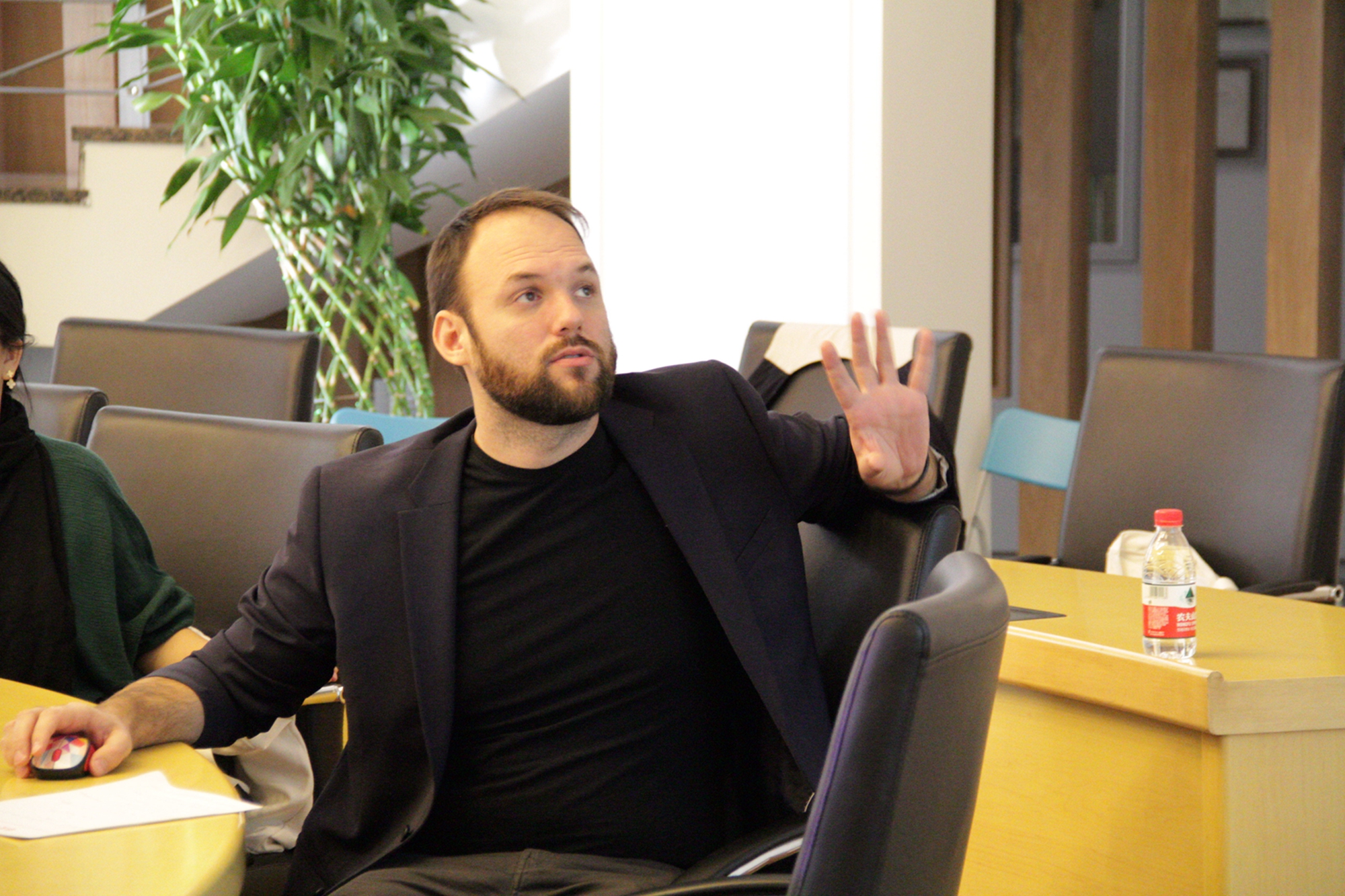
The reception of Chinese philosophy in early modern Europe has a long and varied history. Mateusz Janik considers some impacts and issues with regard to a broad range of thinkers and translators. For example, the Jesuit missionaries understood Confucius as equating 理 li with prime matter, subtly writing God between the lines. Some westerners equated Confucius with Spinoza. Auguste Comte believed the Chinese were closer to Noah than the far-fallen Europeans. Kant, Leibniz, Herder also have their say. Their various interpretations and mistranslations afford some instructive lessons for the current practice of comparative philosophy.
Nicolas Le Jeune
“How to Use a Giant Gourd? Freedom and servitude of the intellectual in the Zhuangzi”
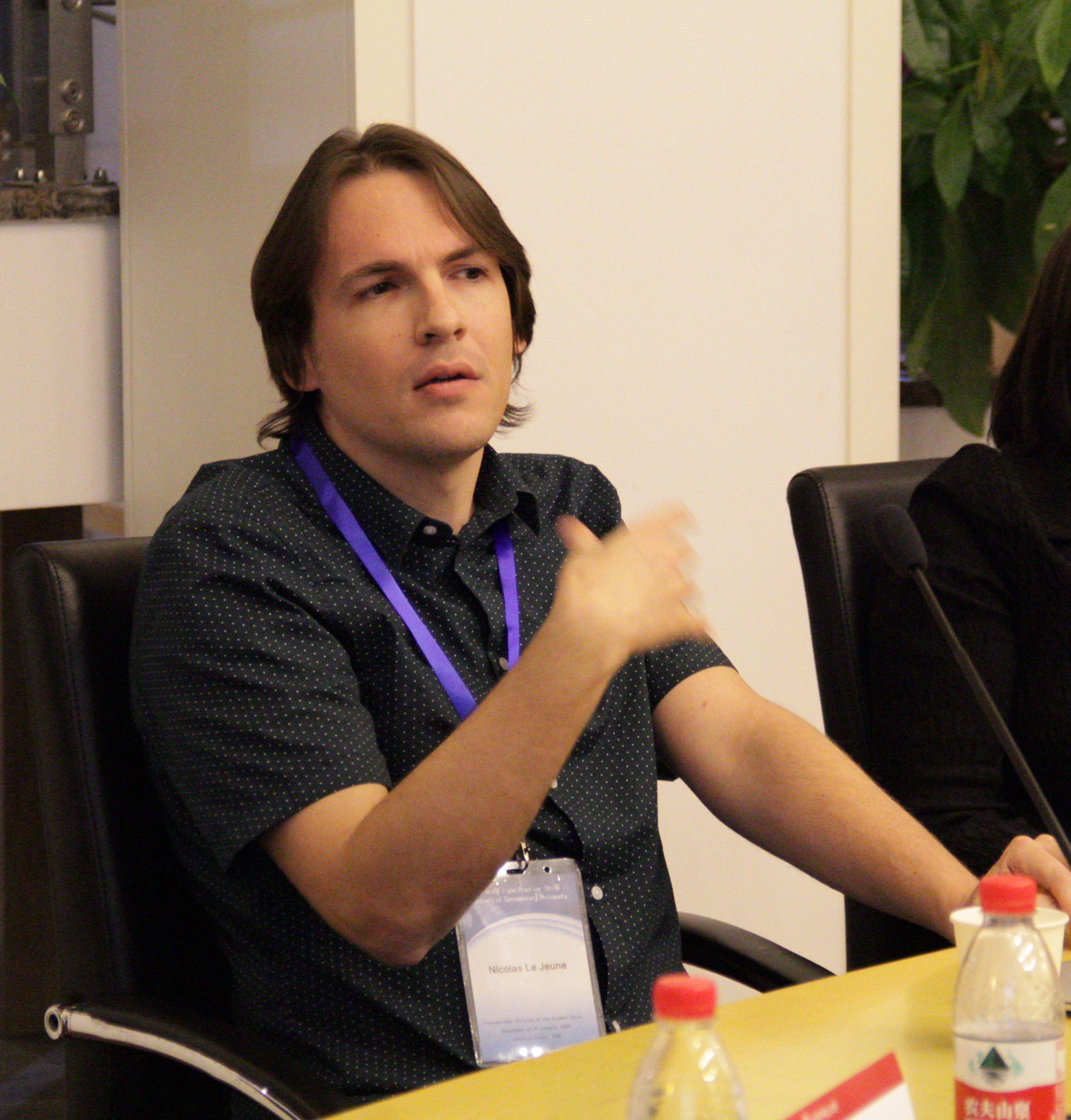
Nicolas Le Jeune’s careful analysis of the parable of the giant gourd in the Zhuangzi dug deeper in to the many-layeredness of the stories presented in this text. He provided immediately the common literal interpretation of the parable, and then used metaphor theory, historical facts, and other parables to more fully contextualize the philosophical content of the allegory in a way that could facilitate more sophisticated discussion of not only stories in the Zhuangzi but of Chinese Philosophy in general. Le Jeune’s conclusion: ren is the product of the new intellectuals of the Warring States Period. “You are part of the new generation of French Sinologists.”—Professor Roger Ames to Mr. Le Jeune
Pritam Saha:
“From wu無 to li 理: Neo-Daoist-Confucian’s Reinterpretation of an Ultimate Philosophical Thought”
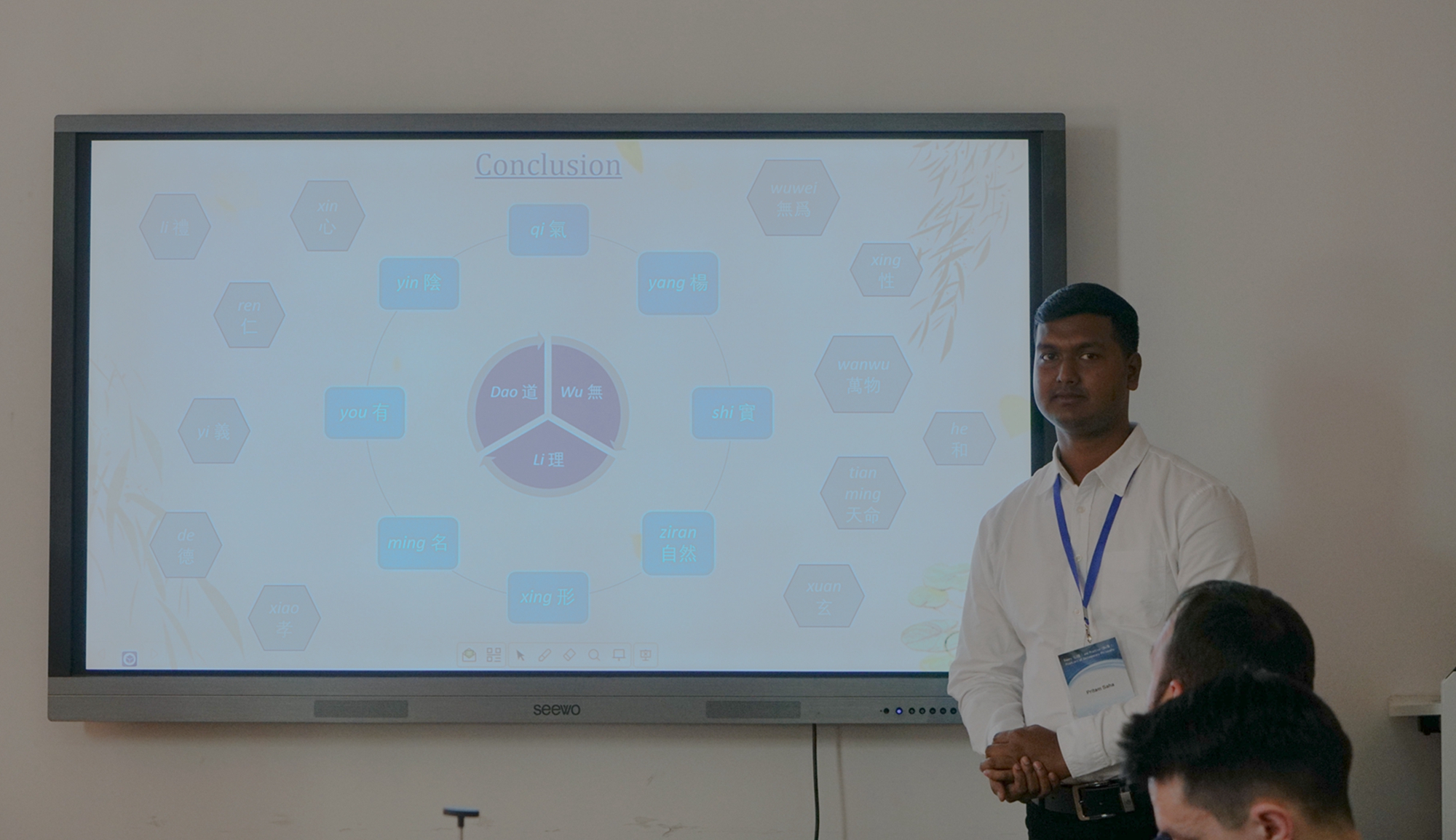
Pritam Saha’s presentation examined the debate surrounding the concepts of wu and li in Neo-Daoism and Neo-Confucianism. In regards to wu, Pritam discussed how different Xuanxue or Neo-Daoist thinkers, including Wang Bi, He Yan and Pei Wei, provided general solutions to the concept of wu. Based on these general solutions to the concept of wu, Pritam suggested a philosophical translation of wu as “that-which-is-not-there”. He then examined how various Neo-Confucians such as Zhu Xi, Cheng Yi, Hu Hong and Wang Fuzhi attack the concept of wu, advocating instead the concept of li. However, Pritam argued that the philosophical notions of wu, li and Dao share the same deep philosophical meaning, insofar as all creatures depend upon wu, li and Dao in order to come into existence. As such, Pritam concluded that all three terms refer to the same Oneness.
Rory O’Neill
“The Happiness of Confucius and Yan Hui in the Lunyu: How it Differs from Mastering Satisfaction in the Laozi”

Rory O'Neill presented the concept of zhizu as it appears in the daodejing. Zhizu refers to the mastery of satisfaction; the skill of being able to be satisfied with what one has, or rather with what is enough, rather than encouraging desires in oneself or others which can quickly lead to a spiral of ever-increasing desires. O'Neill then compared zhizu with the joy (le 乐) of Confucius and Yan Hui as referred to in the analects, that they have as a result of their living an upright life (Zhengtu 正途)—a life focused on learning and the dao. He then invited a comparison between this notion of human nature and that which underlies classical liberal economics.
Ryan Reisner
“Pleasure as a Tool for Achieving Stability: The Chinese Pleasure Book”
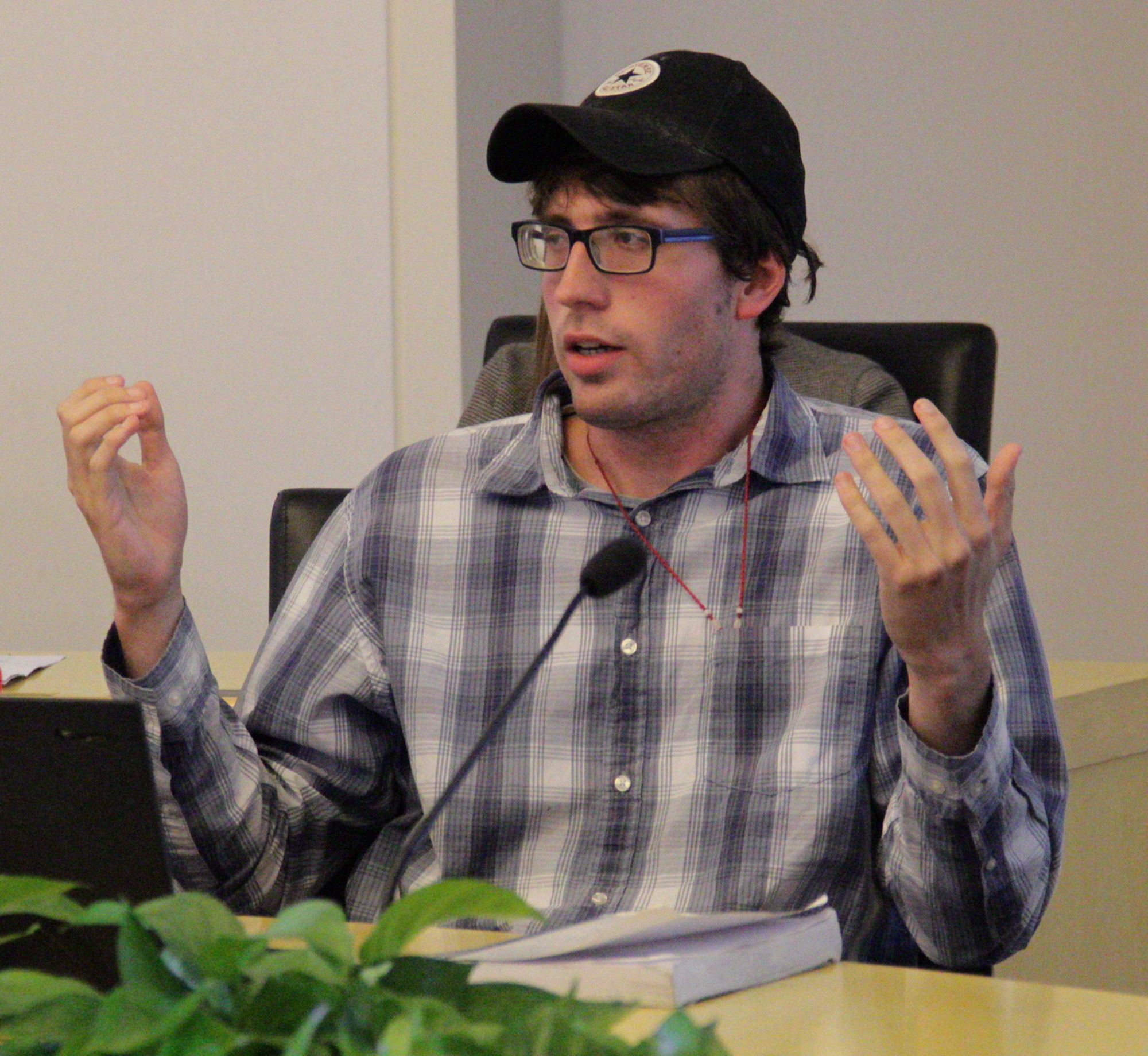
Ryan Reisner provided a discussion on the question “What is le (乐)?” based upon a reading of Michael Nylan’s The Chinese Pleasure Book. Ryan discussed a number of conceptions of pleasure, including: happiness or joy, the antithesis of pain, hedonism and xi (喜) which also has links to hedonism, before going on to suggest that le implies a greater kind of pleasure. Ryan addressed the question of the relation between “pleasure” (le乐) and music (yue 乐) and touched upon thinkers such as Zhuangzi (庄子), Yang Xiong (扬雄), Tao Yuanming (陶渊明) and Su Shi (苏轼). Finally, Ryan discussed pleasure as a political tool with reference to Mengzi (孟子) and Xunzi (荀子).
Tyler Bonnet
“The Happiness of the Fish from the Place of Nothingness”
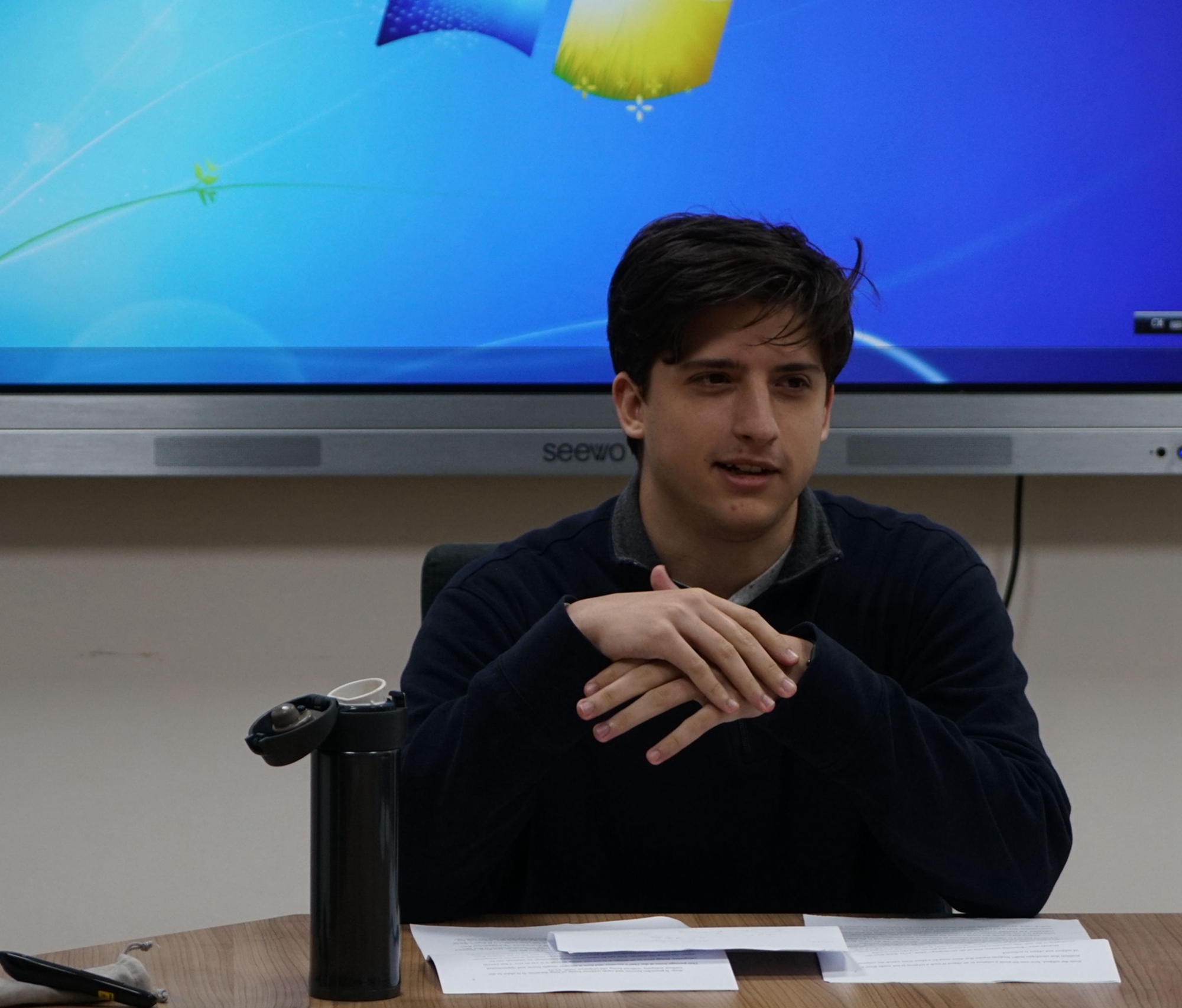
TJ Bonnet argued for using the Japanese philosopher Nishida's concept of basho to understand the famous Zhuangzi passage about the happy fish. He compared the notion of basho to the way of understanding knowing in analytic and phenomenological Western philosophy. From these Western perspectives the knowing relation is between a subject and an object, in the first an action of a subject over the object, and in the second a knowing of the subject through the object. The concept of basho however, allows us to see another kind of knowing relation that envelops both subject and object from which these can be seen. Bonnet compares this place of knowing from the basho to knowing from the Dao, and argues that it is from there that Zhuangzi knows the happiness of the fish.
Wang Huiling
“Language Training in Activities of Academic Philosophy Café”
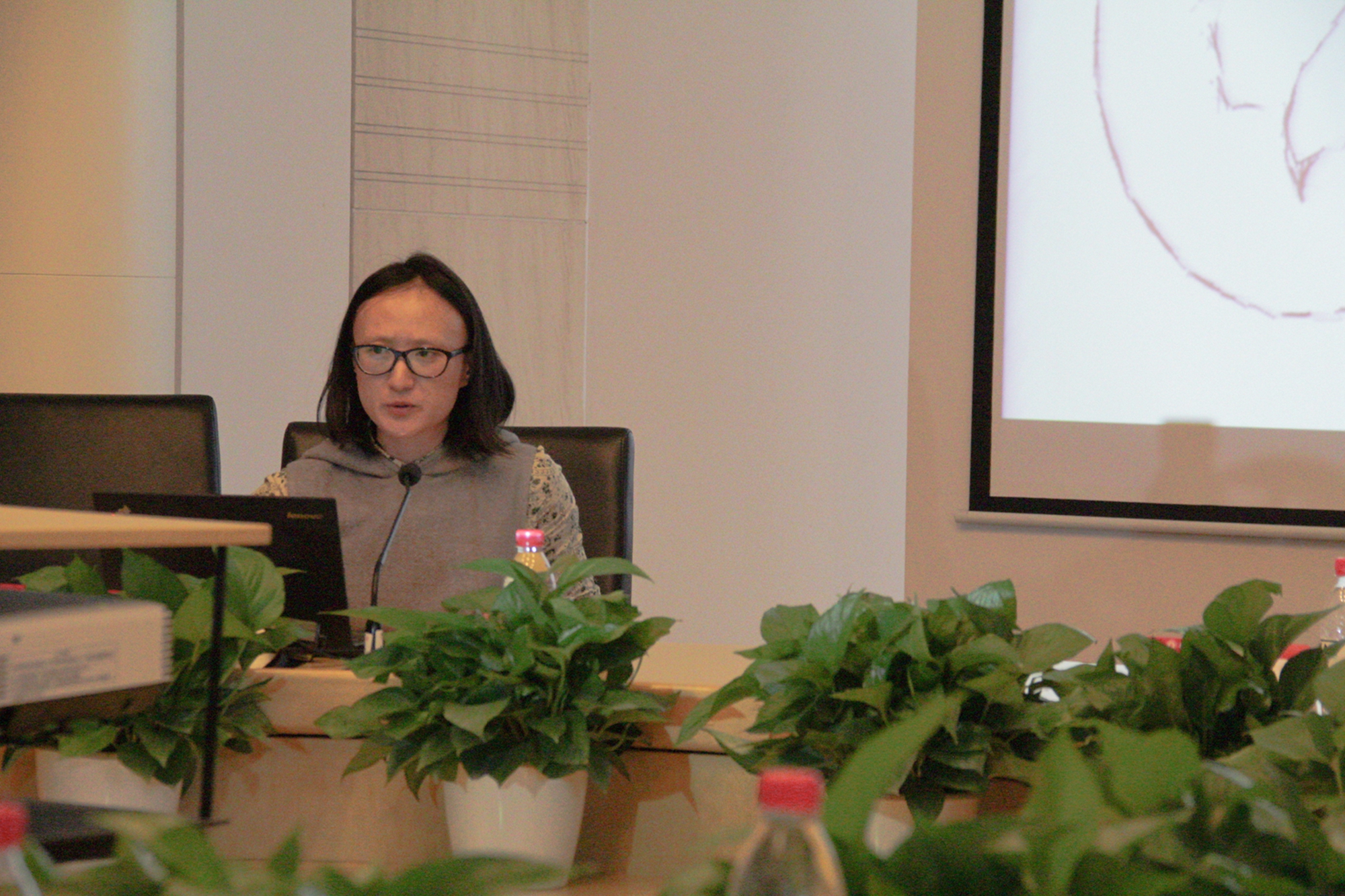
Wang Huiling focused on the practice of philosophy, sharing with the group about a combination of philosophy and business in Inner Mongolia University’s “Philosophy Café”. At the Philosophy Café, her students had the opportunity to learn not only the art of making coffee, but to do so in a philosophical spirit while maintaining high standards of service. Wang’s practical philosophy is highly-international in nature, combining elements of French (café culture), German (philosophical education), Japanese (service spirit), and distinctly Chinese traditions to enrich the lives of her students and customers. Activities organized by the philosophy café range from formal educational activities to language training to thinking
and communication activities. Philosophy Café is a fusion of learning and doing philosophy.
Wawrzyn Warkocki
“φύσις and 自然: On the Moving of Nature”
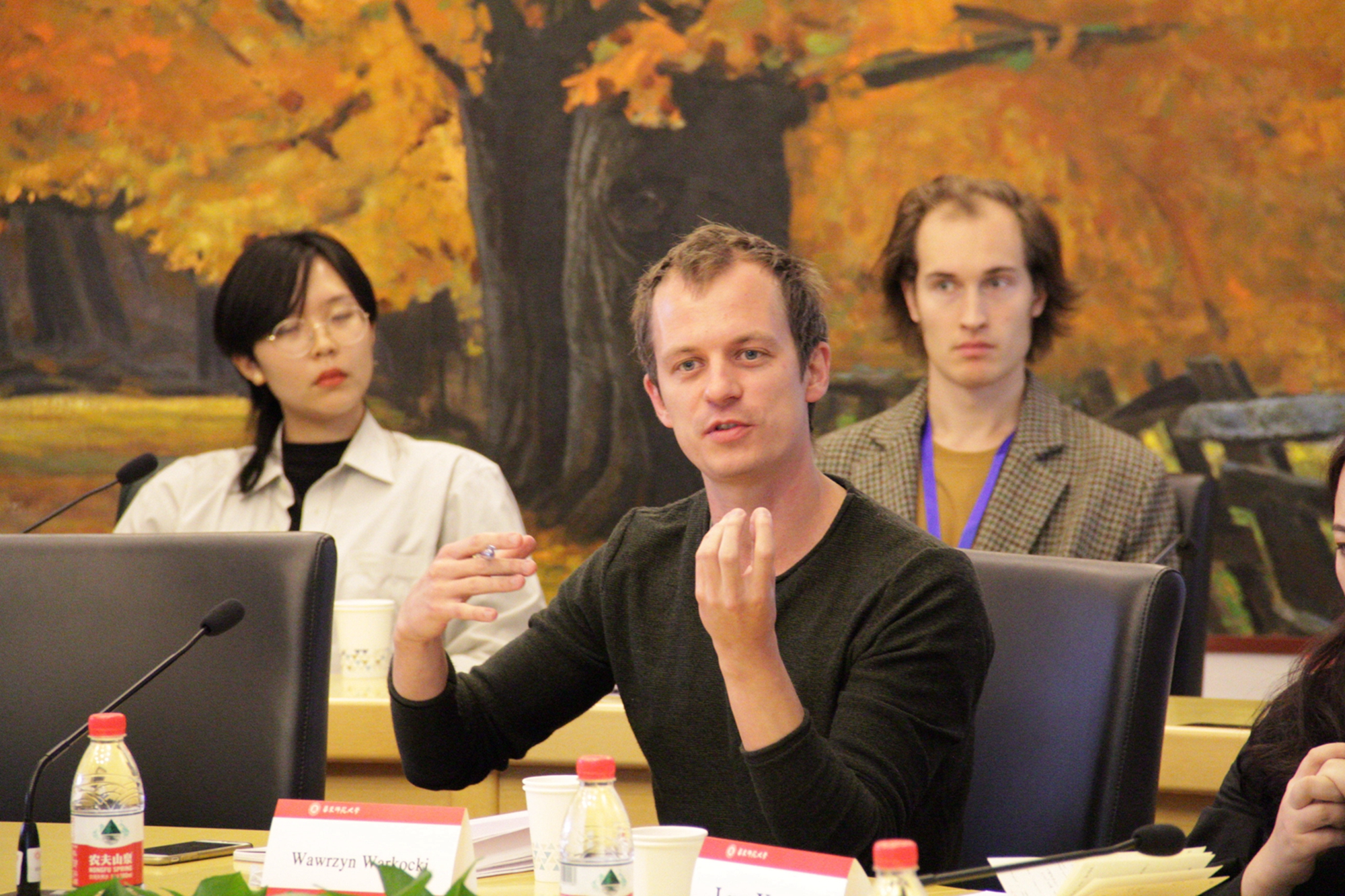
Wawrzyn Warkocki attempts to unravel the Daoist notion of ziran by use of the Greek term phusis. He specifically wishes to develop the idea of nature as a “movedness.” To make his case, he follows Heidegger’s non-metaphysical reading of Aristotelian ontology. This gives way to formulating ziran as a formal operator, displaying the spontaneous disclosure of nature. This allows us to see nature as a singular static event, as opposed to the common dynamic and holistic conception.
Wu Amiao
"Western New Waves in the Study of Chan Philosophy--on Chan Koans"
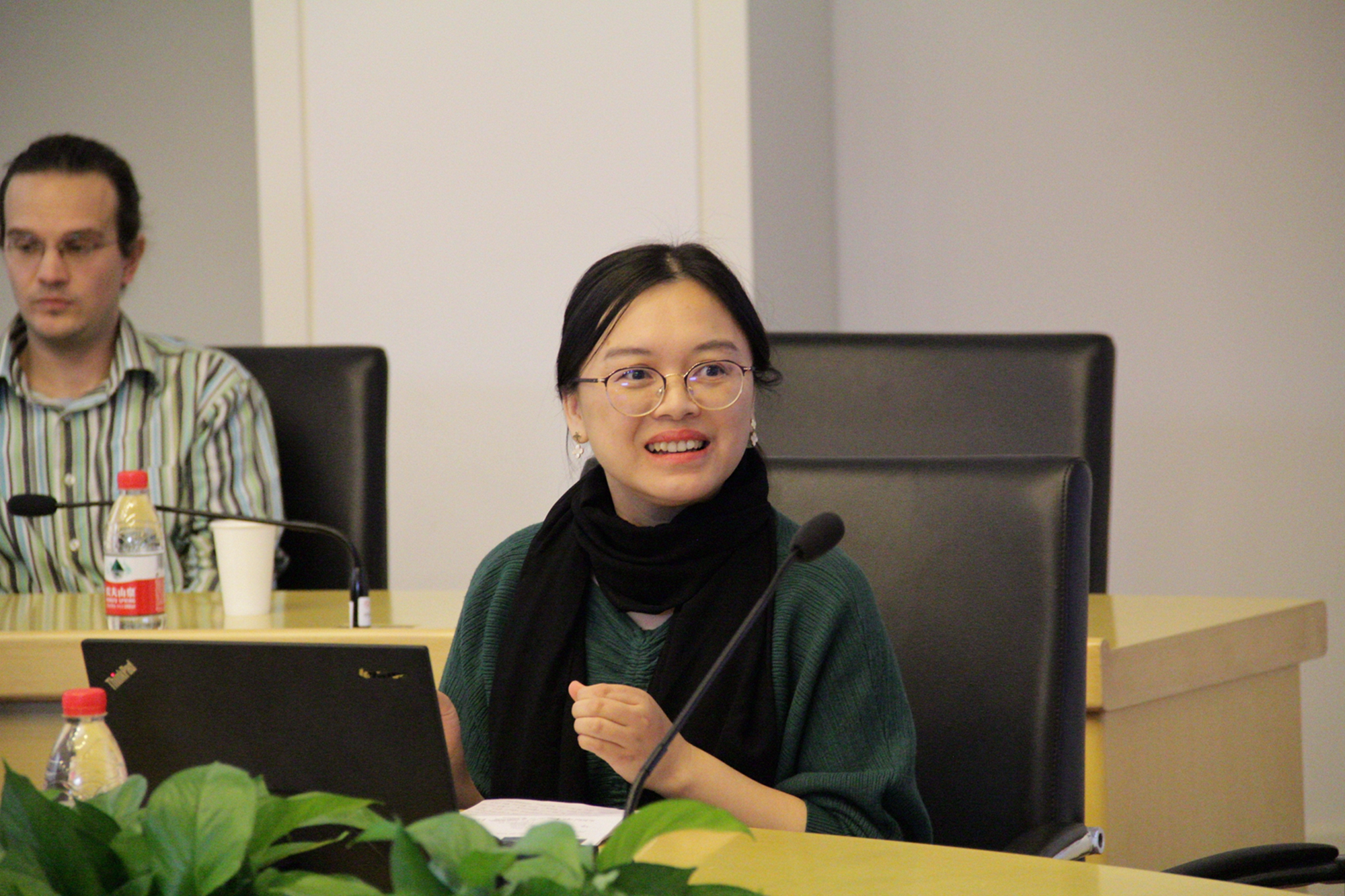
Wu Amiao’s discussion revolved around a historical analysis of Buddhism. Buddhism began in India, developing multiple schools of thought, and then transmitted to China, where it changed--and was changed by-- the ancient Chinese schools like Daoism. This mutual influence is evident especially in Chan, or Zen, Buddhism. To shine a light on the state of its contemporary scholarship, she explains the contrasting research paradigms of some current top scholars on the subject of koans: Faure, Heine, and Wright. On the first hand, Faure is more critical, applying a sociological lens to show how Chan thinkers were innovating in order not to pursue intellectual consistency foremost but rather to differentiate and consolidate their school's influence. On the other hand, Heine and Wright have collaborated to prescribe Chan for a modern lifestyle. Some of Amiao's topics include feminism, the illusion of ego-self, and the Buddha's wordless flower sermon.
Yerin Jeong
“For What, If Not Life? Spinozism as a Model for Practical Philosophy”
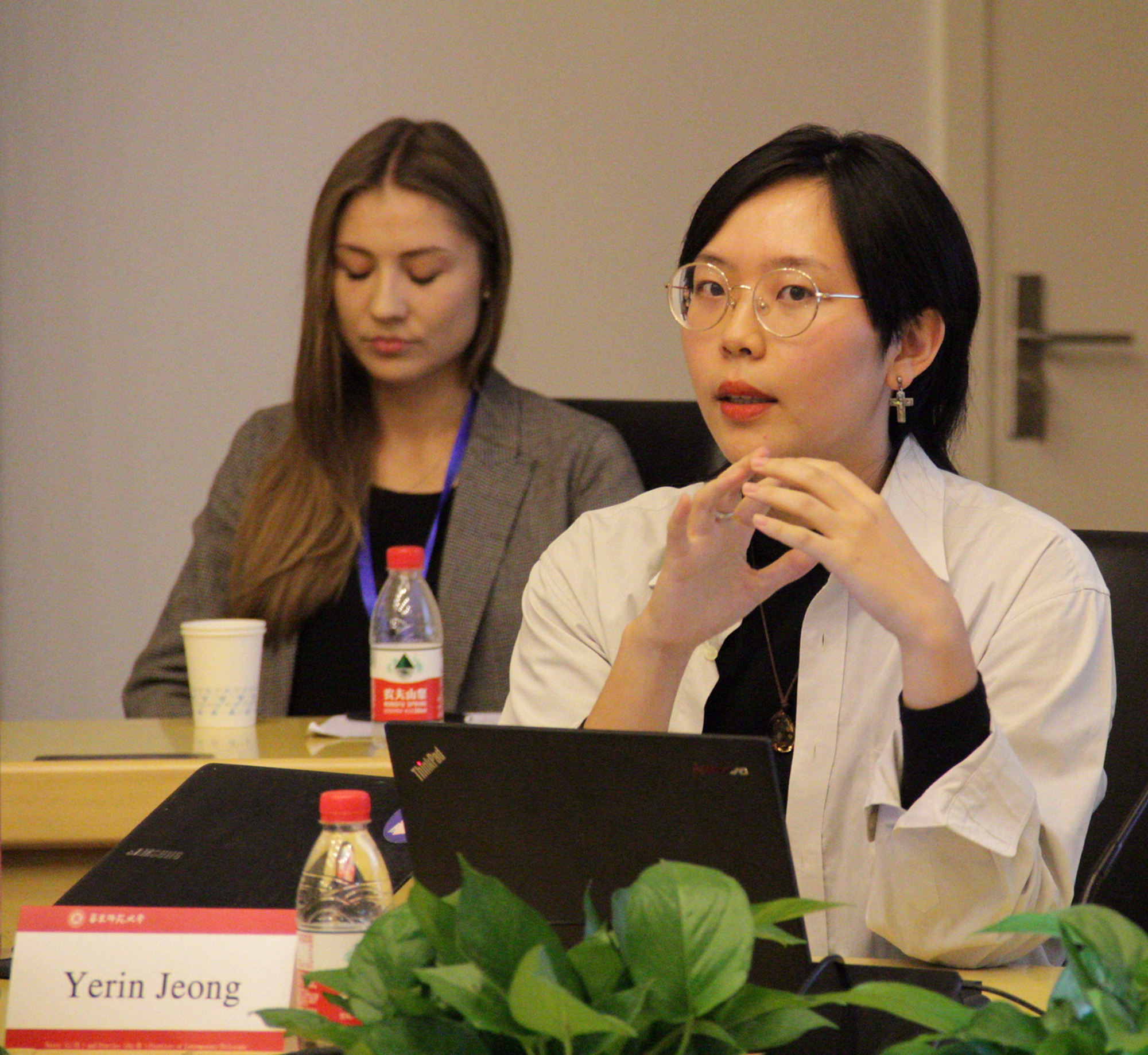
In her paper entitled For What, If Not Life: Spinozism as a Model for Practical Philosophy, Rin Jeong described how theory has been divorced from practice in much of the current philosophical field. Rin uses Spinoza’s model of Ethico-Epistemological Conversion to describe how it is necessary to move from imagination to reason and intuition, from passions to actions of joy and blessedness, in order to move from the realm of servitude to that of freedom. This is the movement from the joy of the drunkard to the joy of the philosopher. We learn from Spinoza’s framework that deeper joy lies in what is life-affirming rather than life-denying. After all, “for what do we philosophize, if not life?”
Zhang Wenxu 张文旭
“《中庸》之“素位而行”的内涵与价值”
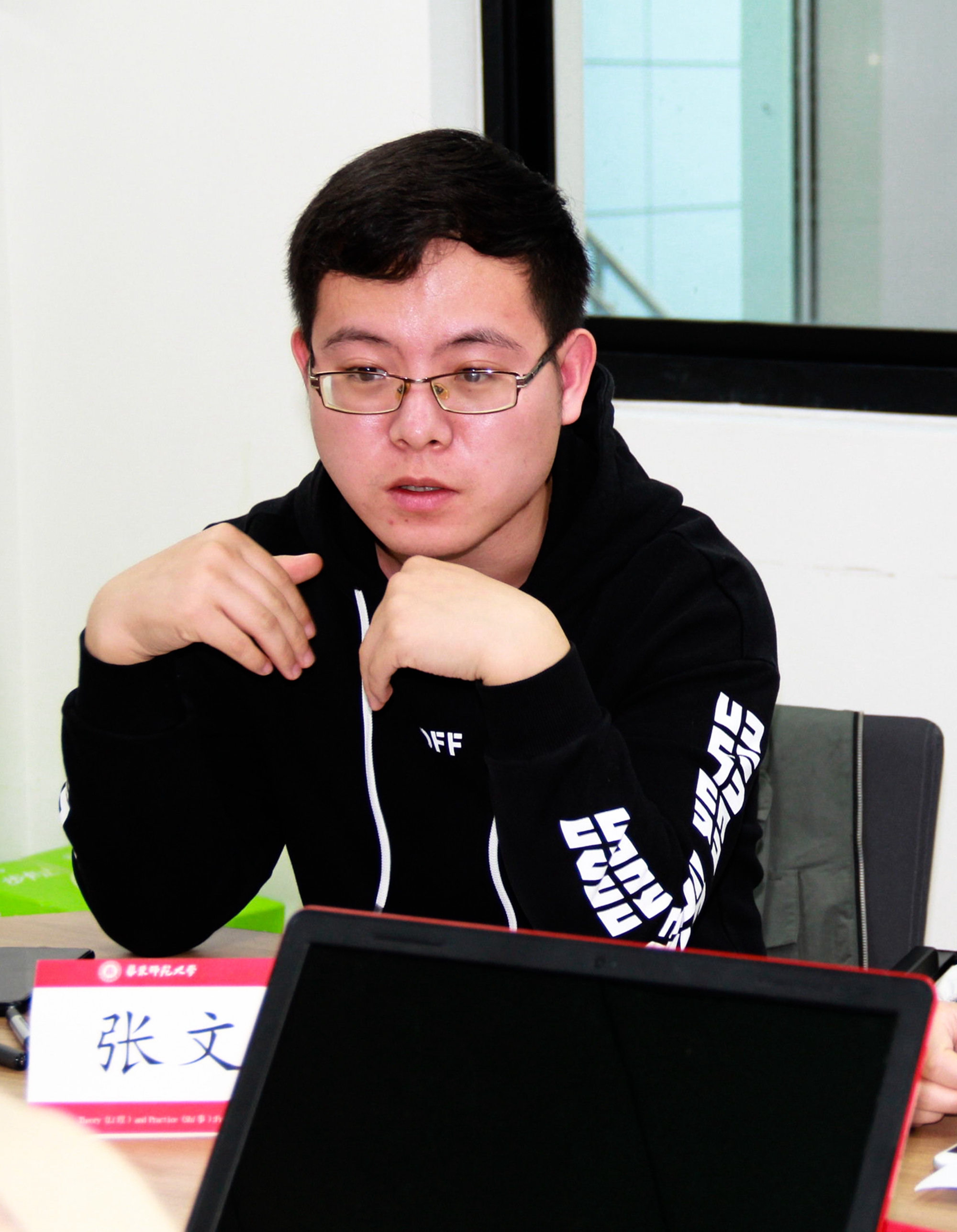
Zhang Wenxu demonstrates the centrality of “doing what is proper in the situation (suwei erxing素位而行)” in understanding the practical wisdom and principles of conduct of the Confucian exemplary person (junzi君子). This is considered from the three aspects: position, dao and self. “Doing what is proper in the situation” should firstly be understood as based upon the situation (wei位)—the exemplary person doing what is possible given the circumstances. Secondly, the eternal dao that is adhered to by the exemplary person is not subject to external circumstances. The dao is kept in the heart but revealed through action, and thus can reach the realm of "self-sufficiency (zide自得)." Finally, through self-cultivation, the state of "quietly and calmly awaiting one’s mandate (juyi siming 居易俟命)" is arrived at.
Tian Ying 田颖
“论孟子良知学说对康德善良意志的补充及超越”
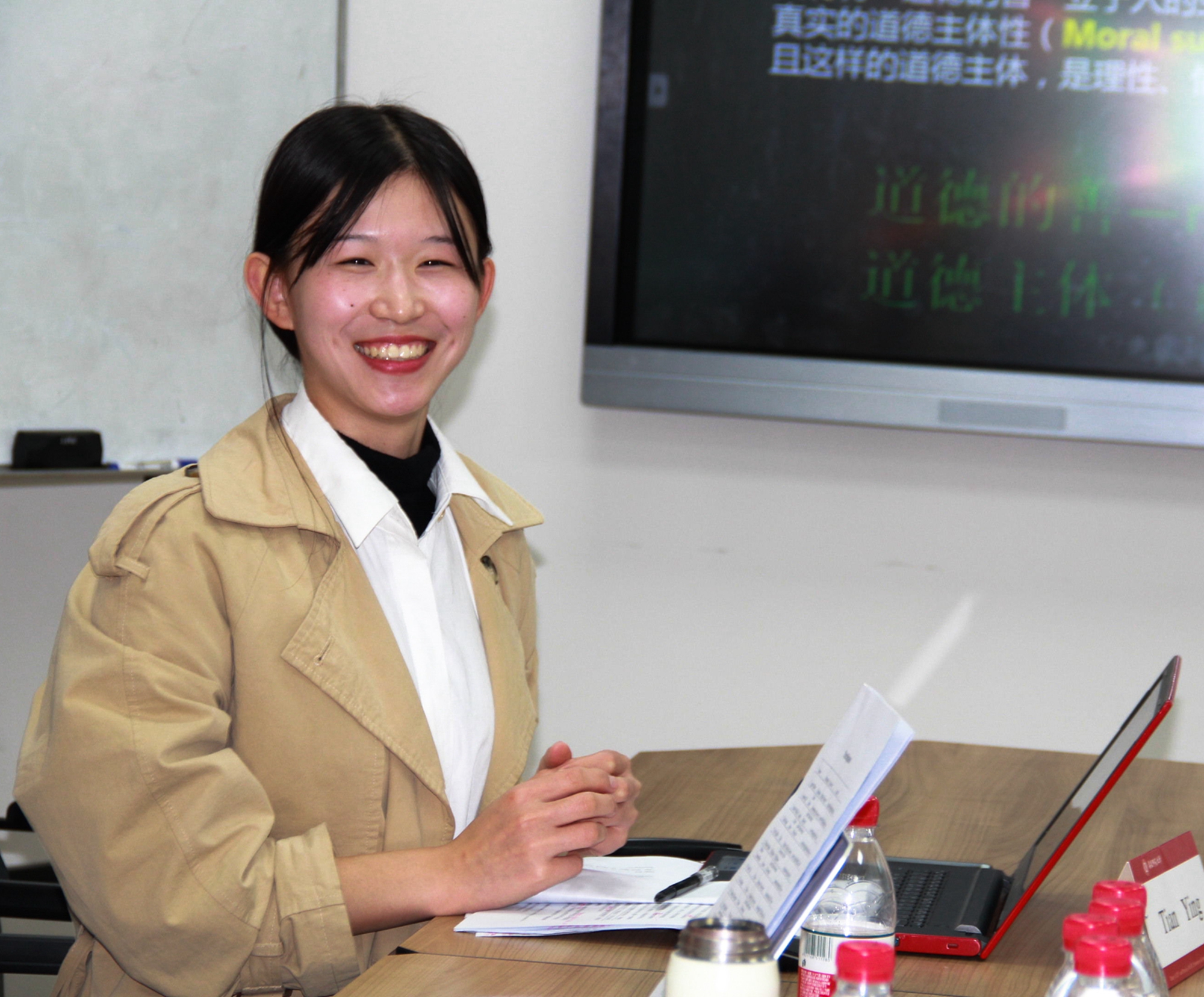
Based on an analysis of Kant's concepts of good will, reason and self-discipline, Tian Ying holds that his moral philosophy cannot solve the problem of the transfer between "I ought" and “I can”, nor the tension between emotion and reason. Expanding upon this, and based on the analysis of the structure and content of Mencius's theory of conscience, the theory of Mencius may be more conducive to the establishment of true and concrete moral subjectivity in human life.
Zhao Chen 赵晨
“卦变说视域下履卦之礼的实践内涵”
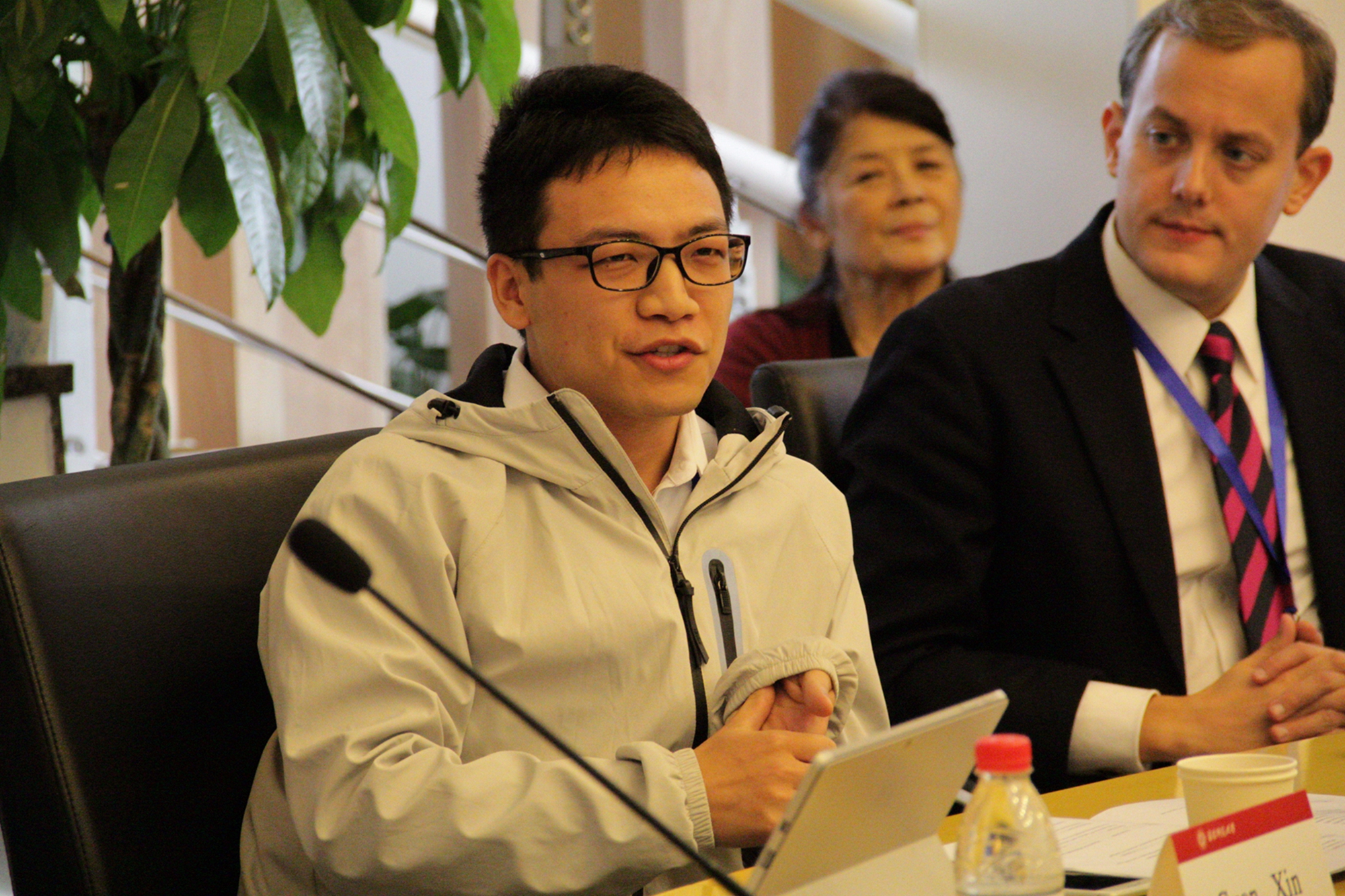
Zhao Chen provided an analysis of the significance of various lü in the Book of Changes, namely: "su lü (素履)", "guai lü (夬履)" and "shi lü (视履)." Zhao holds that from this one can realize a practical of li (礼) in terms of its basis, premise and consequence. The basis of li is change, and this is a change which originates internally. The premise of li is accumulation, that is, its development depends on the external environment. Finally, li requires that people constantly engage in self-reflection.
Final Discussion
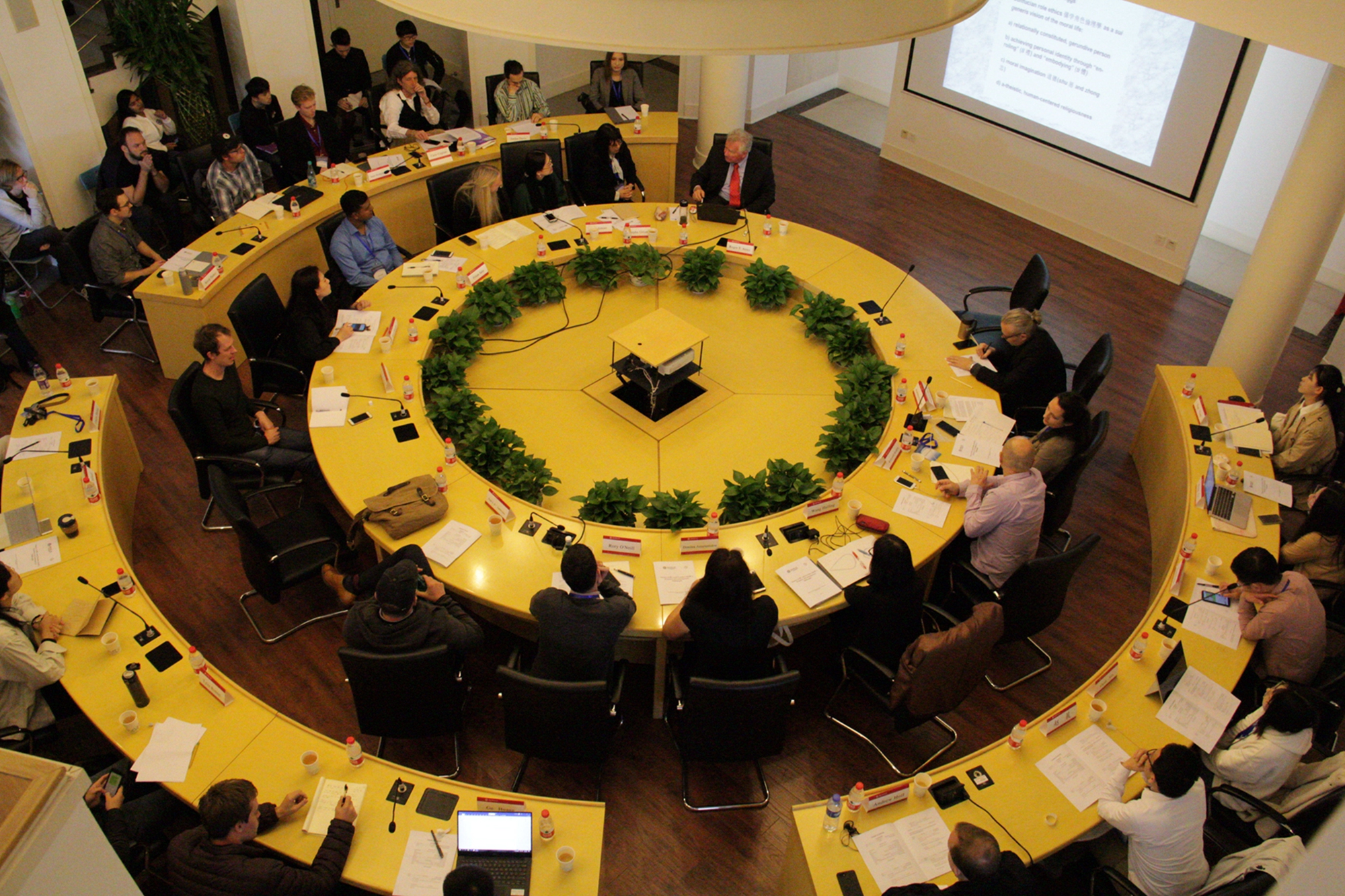
The final discussion was divided into two main parts. In the first, Professor Ames and others gave an analysis of the current job market, the prospect of spending a career in China, and how to go about achieving our goals as scholars. In the second portion of the discussion, students and professor revisited topics of discussion that were of prime interest to the group.